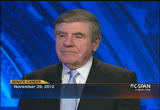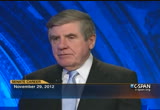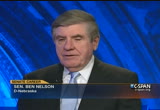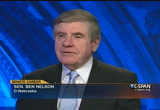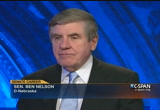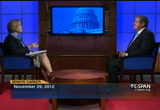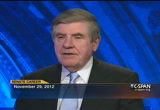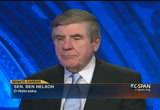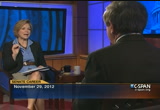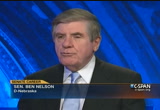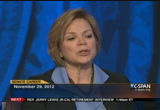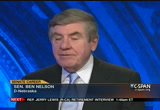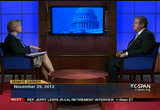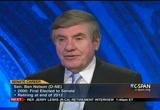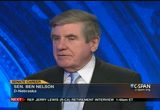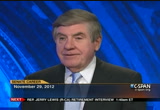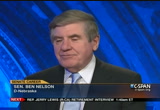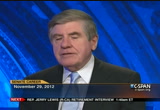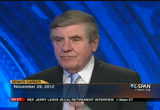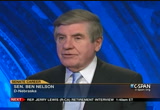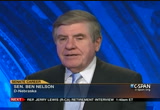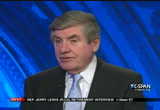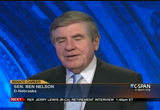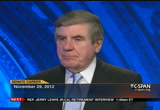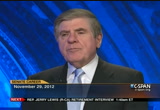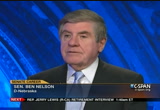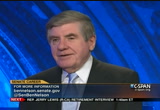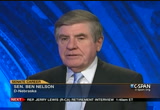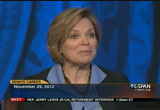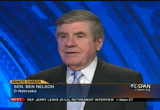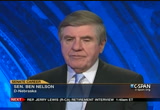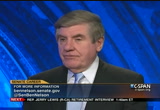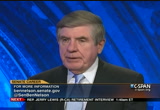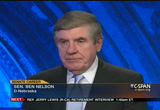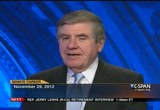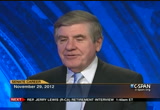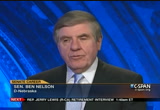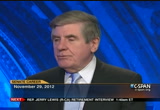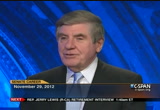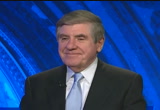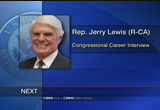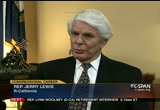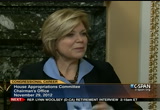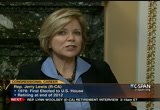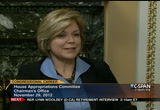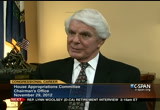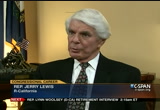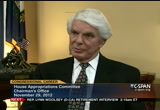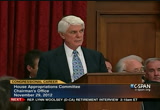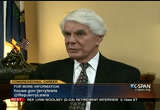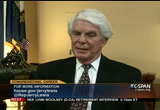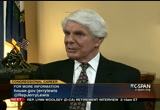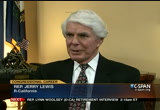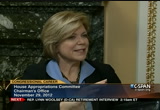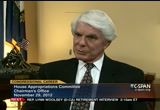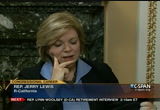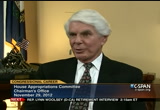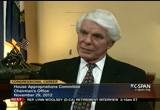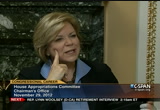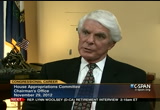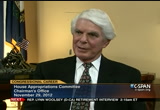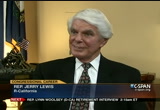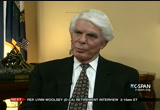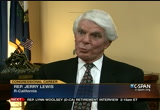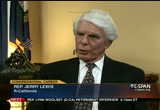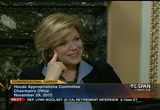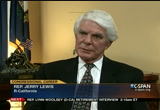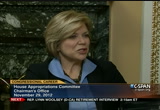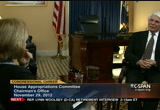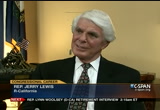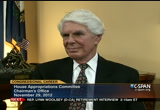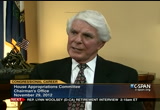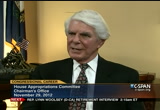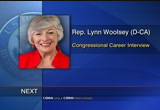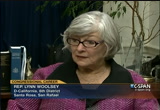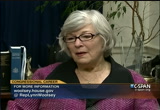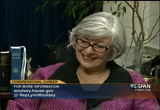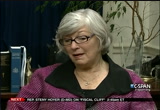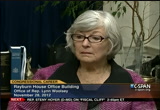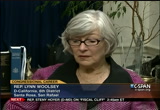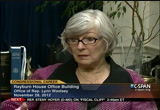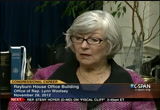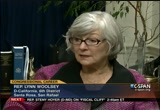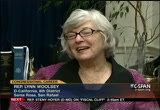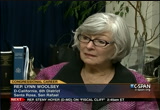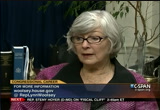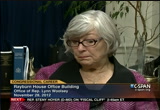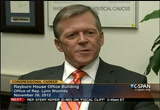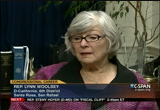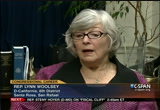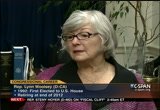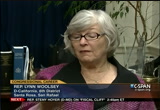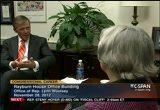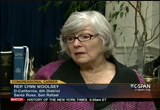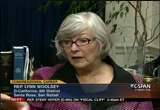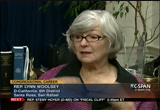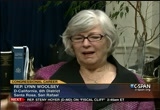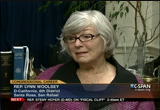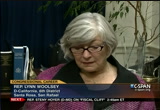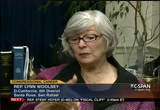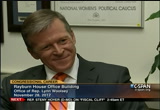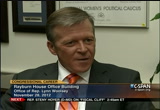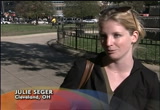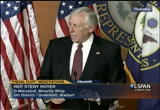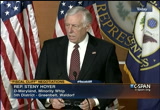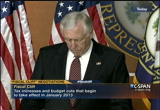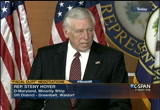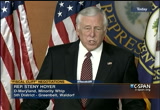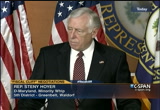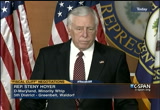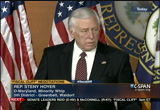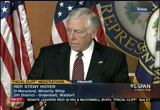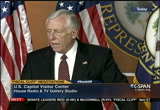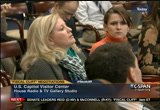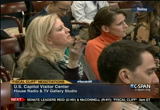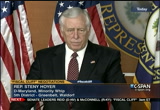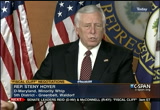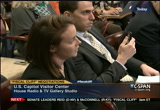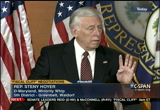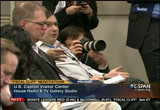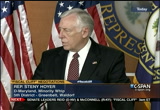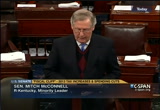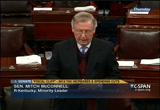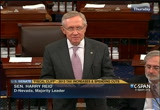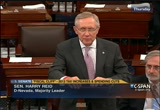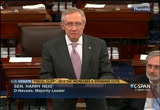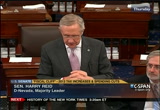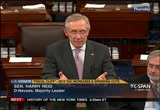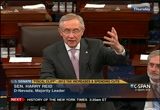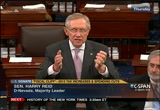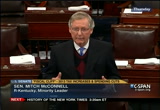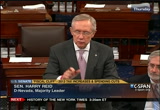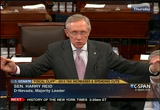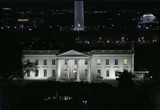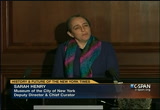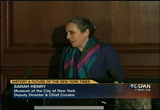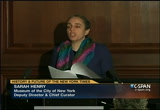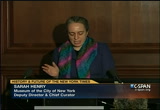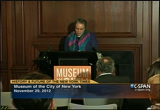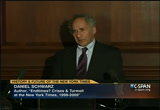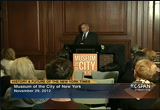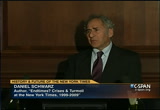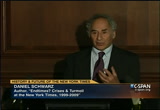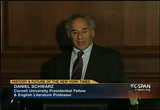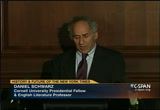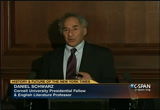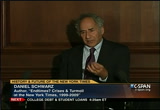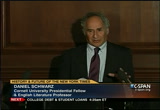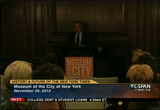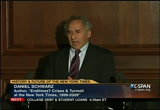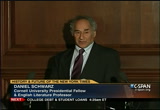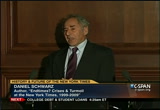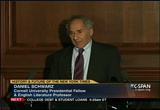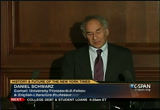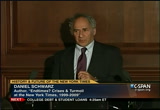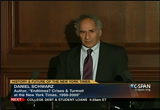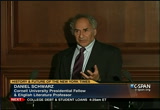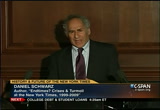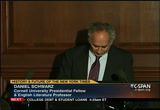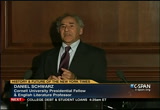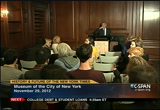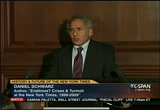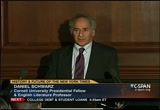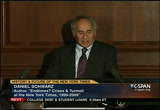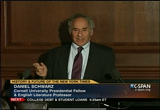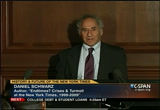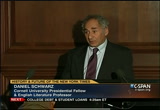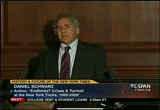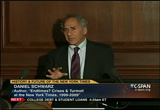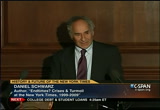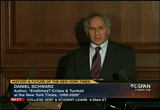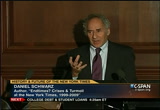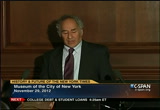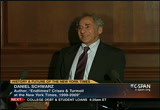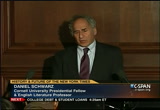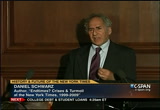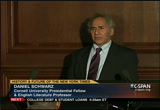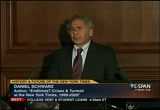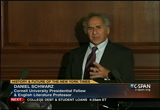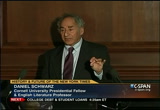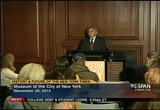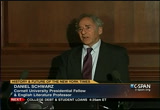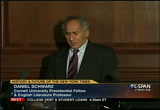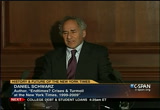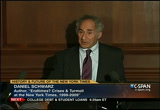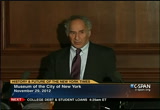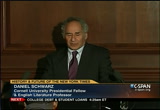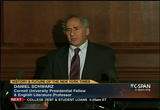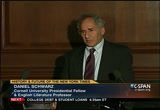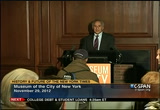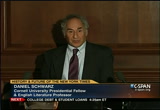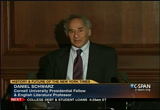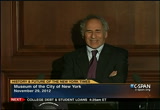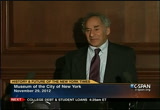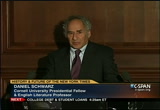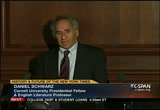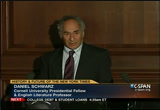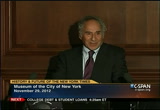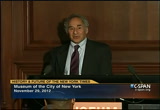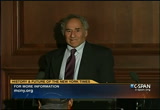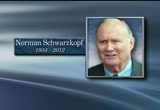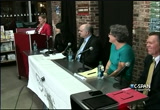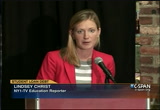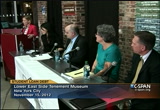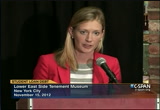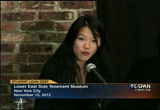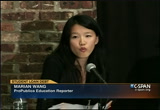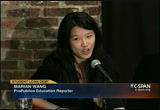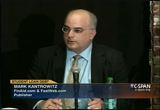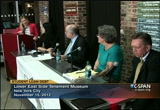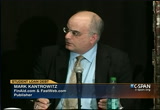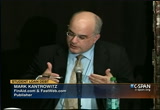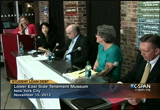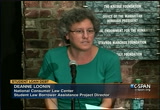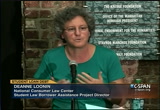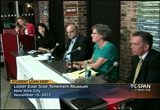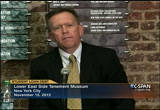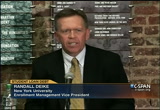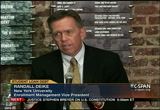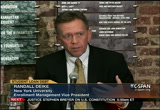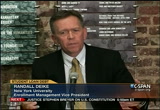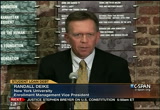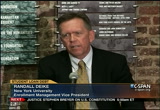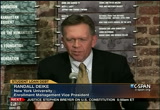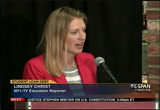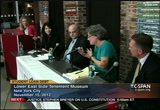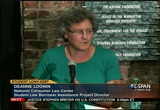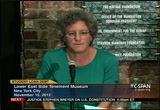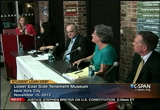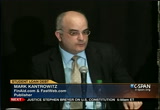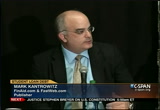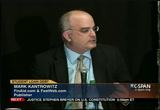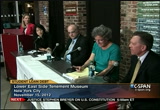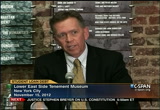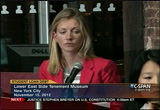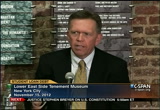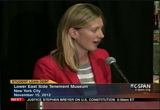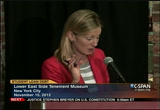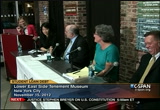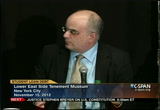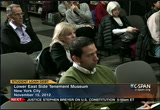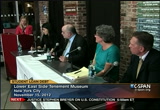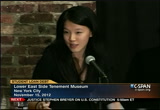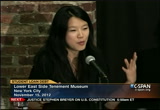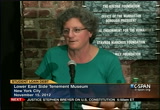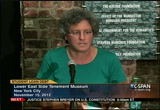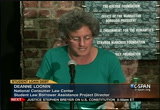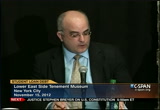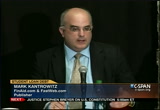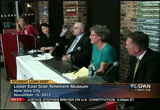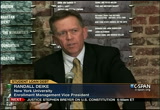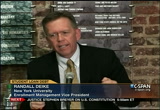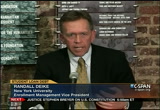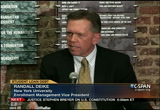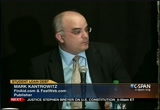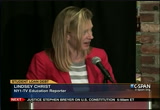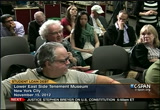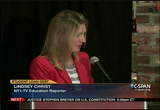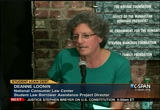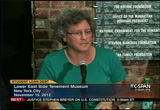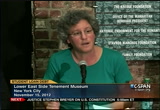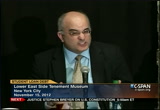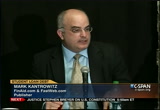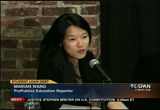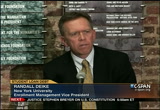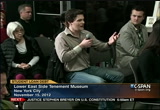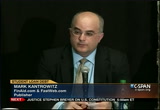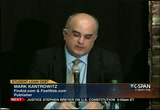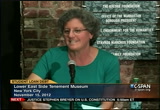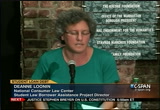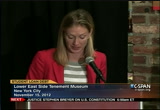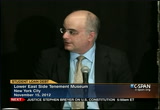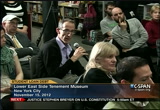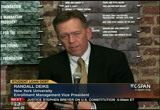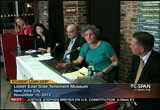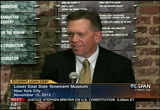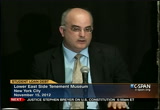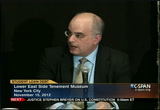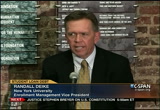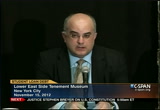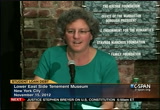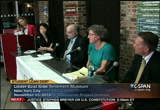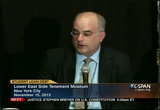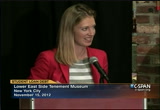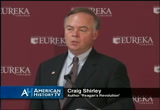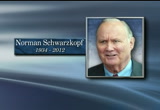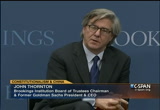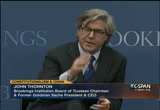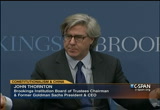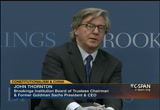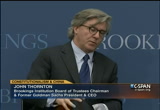tv Capitol Hill Hearings CSPAN December 28, 2012 1:00am-6:00am EST
1:00 am
9/11. the anthrax scare. there were also positive things. the election of barack obama i thought was a very positive statement for the country and moving forward in a way out of a fiscal abyss. i could not have imagined a better time to have been here with all of the things that have happened. >> let me ask you to look back over those 12 years and ask what the high point was. >> when we could work together. maybe the single event that would and body that is the gang of 14. john mccain and i put together six other democrats and six other republicans to avoid what
1:01 am
was then called the nuclear option, changing the rules, turning the senate into a smaller version of the house, where the rights of the minority caucus are ignored. consequently, we were able to work together that way, crossing party lines, crossing with the id administration wanted done or what the caucus leadership on both sides wanted done, it showed we had a certain independence. i will never forget the late senator robert sitting in an office with us all together, sobbing, saying, we saved the senate.
1:02 am
we came to an agreement that we were going to vote to give a judicial appointees and up or down vote, rather than having to go to a filibuster. it was very difficult to get 60 votes. it was difficult at times to get 60 votes to tell what day it was or whether it was day or night. we proved we could work together. that did not work in perpetuity. for that period of time, there was a willingness to cooperate and work together, the likes of which we have not seen since. >> harry reid has announced an interest in changing filibuster rules.
1:03 am
do you support a change? >> we have to do something. it is a process -- people think of a filibuster in "mr. smith goes to washington." i think we should have those rules in place to change it so mr. smith stays on the floor during the filibuster. it does not just run time against the senate. it does not make any sense. if somebody feels strongly enough that they want to bring the senate to a halt, they should be willing to stay there on the floor and explain why, and i think it would be self- enforcing if people would be less likely to.
1:04 am
1:05 am
secret holds on nominees. once you put a hold on them, that was it. that was wrong. we have cleaned up the rules in many different ways. you would have a 60-vote threshold to do some like that. the people back home cannot understand that. they should not accept it. >> what about the lowest point? >> as part of the affordable care at, i tried to get medicaid for the expansion of medicaid, to take some of the burden off the states.
1:06 am
back in 2003, i got medicaid payments by the government to help the state's struggling with their medicaid costs. $20 billion will able to spread across the states to help them because they were unable to meet the rising costs. in 2017, they're going to have a larger share of the costs. we need that is taken care of. they did not know what the cost was. they put a number in as a place holder and it looked like i was doing something for my state when i wasn't. i was trying to get it for all the states.
1:07 am
that is what happened. i wanted to get it knocked out -- if people wanted an opt out. the supreme court gave that. this got used against me as though i was trying to do something i should not have. i was not. the interesting thing is i was asked to do this by the nebraska governor. i did not get a thank you from another governor, who was from another state. >> during that time, you experienced the radio talk-show host circuit and the cable tv circuit. what was that time like and what do you think the echo chamber in american politics today does? >> it is a difficult thing to deal with. it is not just broadcast. it is the blogs and tweets, all
1:08 am
the electronic communications. >> in 2000, we did not have that. >> i was not prepared with what would happen. it was not a condition i had for voting for the bill. i thought it was fairness. i wanted the single payer government option out and i wanted to get adequate language in for abortion. i was not prepared for that. it has changed the news process today away from things that are corroborated and fact checked to the formation and dissemination of one opinion after another, not based on fact.
1:09 am
that has been harmful to the process. if people are not willing to try to get both sides, and only 11 side presented to them, you do not have the informed citizenry you need to have in a democracy. >> with that perspective, now that the affordable care act will begin to become fully finalized into law over the next couple years, we keep hearing those on the conservative side is concerns about what it will do to the country. what are your concerns? will this be a good thing? >> yes, it will.
1:10 am
right now, we have $50 billion a year of uncompensated care. people who do not have insurance, do not have medicaid, medicare, private insurance, mode carry coverage, they are not insured. they have access to health care in emergency rooms and if they cannot pay, and they do not go to bankruptcy, it costs -- the care does not go away. it is shifted to the rest of us who do have insurance. $50 billion. it could be as much as $1,500 per person. paying for those who do not. you have everybody in the system all injured one way or another, then the uncompensated care goes away.
1:11 am
it is no longer borne by those of us who are beneficiaries of an insurance program. that alone is a hidden tax people do not focus on unless it is pointed out to them. it raises the cost to everyone else. the fact never gets talked about. should. >> the largest government health care program, medicare, is reported to have brought levels -- fraud levels as high as $64 billion a year. you can imagine the frustration on the part of the public. why has the city never been able to get its arms around that level of fraud and abuse and what does it say for the expansion of government? >> it is expensive to weed out the fraud and abuse. it takes a lot of government
1:12 am
time and money. i do think it is worth doing. we do not do it nearly enough. but it has been something -- government, at times, is wasteful in what it does not do as much as it is in what it does do. it never is risen to the top level as i think it should and hope it does. one of the reasons i did not want a government-run option is because that would have been a dumping ground for another government program to provide
1:13 am
insurance and move away from the private market. i believe in the private market for insurance. there are cases where people are not insurable in the private market, that you have a government program. that is why it came about. we are capable of crunching numbers to figure out how you cover people of a certain age when you have an entire block of them. we were able to find a way to do it through a private market, which is my preference. sometimes, they are not necessary. we ought to distinguish and not throw one against the other or think they can compete. they cannot. the private market has not been able to find a way to cover seniors 65 and above without trading dollars.
1:14 am
that is why it became a government program. >> let me go back to the idea of compromise and independence. barack obama talk about compromise. for you, described as a conservative democrat, who was criticized by your own party members when you compromised, and that targeted by the gop for reelection, what is your thought about the art of compromise and how much it is valued in this city? >> it is valued to talk about it. when one wants to work together. they send people back here who are committed not to work together. you have individuals who will not compromise, it becomes difficult to merge ideas and find compromises and
1:15 am
accommodations in process or in implementation as opposed to principles. nobody has asked to compromise his or her principles when you are talking about compromise. not eliminating your view about one thing or another, so i think the word compromises over used, underutilized, and miss understood by an awful lot of people. it does not mean throwing in the towel. i have a couple friends i have talked to about compromises and i found in one instance there idea of a compromise is when i see it their way. when i give up where i am as opposed to finding common ground.
1:16 am
finding a middle way to do something rather than black or white. there is gray. you find out what shades of gray you can adjust to. it is almost always not about principles. it is about implementation. >> what are some of the reasons the city got to this point? >> let me explain my political math. addition and multiplication. there are others whose political math might be subtraction and division. division in politics, the fighting with wedge issues and turning things into hateful mess, can win elections under certain circumstances. this country has been divided.
1:17 am
you cannot stay stock. as lincoln said, a country divided against itself cannot stand. if you look at where we have been, obstructionism, deadlock, gridlock, not being able to move forward, pushing this country to a fiscal cliff, pushing a year and a half ago toward default on borrowing obligations, there are enough people now who have taken the approach that you have got to bring this country to its knees to bring it to the senses. that means defaults, over the cliff, whenever it means. that is not productive and it is not necessary and we should not be thinking that way.
1:18 am
we have to come together on this. those who want more spending understand there will be less spending. those who do not want to deal with taxes at all, now there is some softening about where they are prepared to go on that. has been the division that has gotten to the point of almost hatefulness. go back to 2009, the frustrations of people coming out, this is their country, and ankles people had not seen any more, toward one another as opposed to civil discourse. that is where we are. we are moving away from it because people back home are
1:19 am
beginning to see it and say, that is not what i want. i want to see my way wind. if my way cannot win, i want the country to win. >> hard line partisan has contributed? >> it contributes to it. i am in favor, i do not know at what level you have the commission, but get it out of the hands of those who do it for their own interests. that is wrong. it should not be about whether or not i have saved my seat by gerrymandering around to bring more republicans or democrats or get some out of my district. that is wrong. i had to deal with it when i was governor, and i told them i would not accept the plan i put up because that is what they did, splitting a county unnecessarily. my preference would have been to have somebody from the outside sitting down in a
1:20 am
reasonable fashion as to what is best for the country, the district, the state. >> americans more and more identify themselves as political independence. what has that done over the past decades? >> not as much as super committees and the citizens united case. that has probably done more harm than some of the other things. less partisanship. less willingness to come together as a party. i happen to believe in political parties. in the nebraska legislatures, non-partisan. people run for the seat. they do not run as republicans or democrats. you know generally who they are, but it is not uncommon for democrats to be chairman of committees, even if there is a majority of republicans unofficially.
1:21 am
i come from an environment developed by the late senator who came to nebraska and fought for the legislature and officially was non-partisan. some people say he did it because he wanted to save money. the main reason he did it was to get rid of the conference committees that we go through back here. the work is a pile up on the football field. it changes hands five times before they blow the whistle. what we have in nebraska is officially nonpartisan and works.
1:22 am
that is a backdrop for me. when i came here in a partisan environment, i said, i do not have to subscribe to a non partisan environment. my goal was one nebraska, not a republican or democratic or east or west. i represent all the people, even those who voted against me. i have taken that independent approach back here. i have to represent all of the people. >> did you ever contemplate becoming an independent? >> no, because the democratic party never pushed me out. i have been well excepted by the democrats in nebraska. ultimately, the democrats did not leave me, so why would i leave the democrats? >> there are so many changes that happened in this country.
1:23 am
the whole concept of national security and how that has changed since 9/11 and whether we are in a better place? >> most people feel we are safer than we were. that is what national security is about. it is a state of mind sometimes as much as it is a state of security. i think people feel they are better off. i am glad that is the case. what we have gone through is a difficult price, a high price, to get to this level. it is not just the inconvenience at an airport.
1:24 am
it is not just the fact i cannot pull my car into the building anymore. it is not that i have to show my id. it is not that. what i worry most about is what we have given to the government in terms of the ability of the government to spy on us and how that has evolved. people are bothered as much by that as they are about almost anything else. i think we have to continue to reconsider some of the things that have been done, the granting of broad powers for investigating, so we do not make a permanent mistake for a temporary experience to protect ourselves from radical islamists and terrorists who
1:25 am
continue to be ready to sacrifice themselves to take us out. i hope we reconsider some of the things we have put in place and ask, are they the reason we are safe? if they are gone, would we be less safe? are there other ways to be able to do some of the security measures that would get a better result? i believe in cost-benefit analysis. if the cost is too high, weighed against the benefit, you have to ask, should we do that? what is the risk assessment we get from these measures? i think you need to take a
1:26 am
common sense, rational approach to them rather than an emotional reaction. >> what are your reflections on the country's prosecution of the two major wars? >> it is pretty hard to be critical of the role we have had in going into afghanistan to reduce the taliban and to eliminate it as a safe haven for the al qaeda operatives as it was at that time. it is pretty hard to be against that. getting out has taken longer than any other war in history, to extricate ourselves in an appropriate fashion. we were told there were weapons of mass defection. i think people have legitimate questions to ask about iraq.
1:27 am
>> what about your own views? >> my reflection is, what i have voted just to take out suddam hussein? no. would i vote to take out saddam hussein because he has weapons of mass destruction that he could use against us or others, israel, or other locations? that is a different question. weapons of mass destruction drove the votes. >> we have a few minutes left. sometimes i see the description of you as a penny pincher. >> tight as three coats of paint. >> with that perspective, how
1:28 am
did the country get into the situation we are in right now, with the huge debate over the size of the deficit and the debt? >> go back to 2001 and thereafter. the cost of the wars was not included in the budget. they were always supplemental. they did not show as a deficit. while the budgets looked reasonable during that time, the actual spending was greater. people did not pay as much attention to the debt. it just kept mounting and growing. we borrowed to pay for the worse when we did not ask people to make sacrifices financially. there is a difference between borrowing in the future, pang
1:29 am
forward and backwards, or having to pay right now. people might have felt differently if they had felt a pinch right at the time. they would have asked different questions than were asked. that is one of the reasons we got where we are. >> could you have been any more vocal about appropriations? >> i was vocal. when i got on the appropriations committee, i became chairman of the legislative branch. that is everything, all of the buildings. office buildings, 1700 capitol police forces, and all of their help, support staff. i held the growth flat.
1:30 am
then we cut it by almost 5%. this time around, we let it grow a little bit higher. protect the dome so it did not fall in. what i tried to do was be as tight as three coats of paint, penny pinching to make sure if we set an example of reducing growth, if we could do it, others would not point to us and say, they are being hypocritical. i had more than a few comments from my colleagues about cutting back on senate budgets for your office and stuff like that. that is what you have to do. you have to watch the pennies and dollars every day in government, or they will get away from you. they do.
1:31 am
we do not have enough people willing to say, no, to increase spending. the spending is not all wasteful. the question is is it all necessary or necessary to be done that way. >> mitt romney kept saying this country could be on the road to be more like greece if we did not get our arms around it. the unemployment rate remains high. are you optimistic in the short term about our country's future. >> it is hard to be. i tried to be. if we can get this resolved, this fiscal cliff situation, and have a pathway to seeing the deficit be reduced, cannot do it overnight, if we can see there is a path, a trajectory of slowing down the growth of spending to the point you can see the deficit will ultimately go away over a reasonable time, people will start investing again, hiring again, and i
1:32 am
spoke to a business group yesterday and asked if they would hire just because they get a tax credit for hiring people. they said no. if you see the deficit will go away and there is hope we are on the right path to fiscal sanity, will you then hired? yes. we will have markets for our products and services and then we will need more people. we are stuck right now because all we have done for a year and a half was kick the can down the road. i voted against the act a year- and-a-half ago because i predicted we would be right where we were going to be at
1:33 am
the end of this year. we had a year and a half to work together and build a bridge so we would not fall off a cliff. what did we do? electioneering. it was all about waiting until the election is over. when the elections become more important than governing the country, you get into the trouble we are in. it is not just wild spending. it is not just tax loopholes. it is about governing and fiscally managing things as you go along. it does not just have to be in the white house. it has got to be in congress as well. >> given the frustrations you have voice, if a grandchild said they want to go into politics, would you rejoice? >> i would be straightforward with them. when i decided i wanted to run for governor, somebody asked me if my skin was thick enough. i said, sure.
1:34 am
i would encourage them to do it. there are bumps in the road and historical changes we have all seen and they will continue to happen. i predict longer-term there will be more independent-minded people who want to work together to get things accomplished. the bipartisan word will ultimately have more application. i was amused harry reid came back from a meeting at the white house and was asked what happened and whether there was a lot of happy talk.
1:35 am
we have to move from that to the appropriate action. i understand you have to stand for principle. i also know this country has to move forward. ideologically driven to extremes, special interest groups, and others who are not willing to sit down and find solutions, are causing us to be stuck. somebody said we are neutral. you cannot be in neutral if you are in reverse. you are losing ground. that is a temporary situation. the question is how long. i do not know. i am optimistic because we cannot continue this way. people will ultimately understand we cannot. hopefully, that is before this year ends. >> what is it like to be a lame duck? >> you are not a dead duck. you are still in office.
1:36 am
the session almost becomes like daffy duck if you are not careful. i am as committed today to finishing this job by the very last day as i was when i started. prepared and want to work with people. the majority got us into this mess right now by passing the budget control act not working together. i want the members of house and senate in both caucuses remember it was bipartisan to work together to get us out of it. i pledge to continue to work. i knew in my heart of hearts all we would do was kick the can down the road. it all comes to the ultimate deadline. i worried things would get worse.
1:37 am
you do not resolve things with procrastination. >> what do you think about doing next? >> i will not retire. i have no desire to. i may slow down. somebody asked if i will be as interested as what is going on in washington as you are this year. of course. but i will take time for myself and family and friends. i intend to be engaged and hopefully someone will ask me to serve on an advisory board. i will occupy my time with productive pursuits, some of them that i have had to put off. people have said why did you not just run for a third term. i looked at the game clock and i know i can do those things
1:38 am
today, but seven years is a lot of time and i did not see how i'd ever get back to the bucket list. one of my kids said i want more time with you. with grandkids and family, you need to spend more time doing that. they have sacrificed more than i have actually. i have been able to do what i have wanted to do and they have had to give up time with me. it is time for them not to have to sacrifice. >> enjoy the pursuit of the bucket list and thank you for the time you gave to us. >> great to be with you. thank you. [captioning performed by national captioning institute] [captions copyright national cable satellite corp. 2012] >> on friday's washington journal, a look at the countdown to the fiscal cliff. our guest will be a wall street
1:39 am
journal financial reporter. then, an explanation of home ownership in the u.s., hit by the author of "american nightmare." and discussions on the economy, poverty, and hunger. we'll hear from the head of u.s. economic officer service, and the urban institute's senior fellow. california republican congressman jerry lewis is retiring from the house after 34 years in office. the 17 term congressman represents the 41st district in southeastern california, which includes parts of san bernardino and riverside county. this interview is 30 minutes. >> congressmen jerry lewis, you
1:40 am
are leaving after three plus decades here. in what ways is this institution different than when you joined? >> there have been many changes. the most significant difficulty with those changes is we have tended recently to more and more polarized ourselves. there is a tendency to want to paint everything in partisan terms. 90% of the issues we deal with have nothing to do with partisan politics. we are here to attempt to respond to our constituency needs in a way that reflects their priorities. the partisanship has gotten in the way of members working with each other. >> can you trace the roots of that? >> i think i can. i arrived here in 1979.
1:41 am
one of my classmates was newt gingrich. early on, he took on as his target, the speaker jim wright. that was the beginning of some of this polarization. there is little dout th -- and doubt that in the days of to ill, it was tip o'ne a better time. since those last couple of decades, the institution has suffered from too much partisanship. >> before mr. gingrich, i would imagine he would argue the republican house members have spent decades in the wilderness and he was the one that found a way to bring them into the majority in the house. how do you balance the pluses and minuses? >> there is not any question that that effort to paint a picture of jim wright's service laid the foundation for a majority.
1:42 am
that was a healthy thing. i do not believe it was a good thing -- we have been in that for far too long. in turn, it is significant for the american public to know that appropriations committees work is where either you spend money or you do not. ideally, you are here to work with one another to be as responsive as possible to your own constituents and taxpayers. within the committee itself, the more we can talk to each other as individuals and human beings, the better off the institution will be. >> the kinds of organizations that track members' votes, when they look at yours, saw an ad and earlier you more frequently crossed the aisle to vote with democrats. in your later service, 96% rating. is that reflective -- you tell me.
1:43 am
did the house change? >> it is a reflection of polarization that takes place at a leadership level. party loyalty is important. havet's not good to everything painted in those terms. but our voice can be heard in a fashion that says we can work together best at the subcommittee level where we talk to each other about policy direction. if you want do -- to do partisan battle at another level, that is ok. but it is important for members to talk to each other as human beings. >> there are many people decrying the partisanship. some who think it is great. if you think it has been a bad thing for the institution, do you see it as the foreseeable future or are there agents of change that would allow more across the aisle working together?
1:44 am
>> i feel very strongly there is really hope that we will recognize the value of talking to each other, that we will return to more bipartisanship and realizing we can best serve our own constituents by knowing there is a great middle out there that makes of america. the more we reflect the middle, the better off our committee will be and i think the service we provide will be better. >> what gives you that hope? >> a lot of people are recognizing the pathway we are on will not help. more and more members are talking with me where we discuss with one another how we can improve the place. i hear it almost every day. i encourage it. >> there are people who believe partisanship is a good thing because ideology and the direction of the country moves
1:45 am
in the way they want. for example, people have come in with the tea party. what do you think of these hyper-partisan groups outside of the congress that attempt to exert their influence? >> one of the more fascinating experience i have had involves a gathering. my first meeting a couple years ago, with tea party types. my staff was concerned about this new group. i said, give me their telephone numbers. i invited them to our session. they were there that evening to express their concern about health care being nationalized and taking over that piece of their personal life. they were not angry with congress per say, but they wanted to see us spend whatever money we could spend, without assuming every answer lies in
1:46 am
washington. one of the best things that has ever happened to us in our work, that somehow that will of lysing missed my house, is because i got elected to congress. >> talking about the appropriations process in particular, here we are with the fiscal cliff and we are in the lame-duck session, but the debt to gdp ratio for the united states has continued to arrive. there are many people who have pointed fingers. what is your response? >> there is no question the pattern in washington is to spend every dime we can collect. almost regardless. there is a view that says if a program is funded, it ought to continue to be. the appropriations committee has the responsibility of oversight to make sure we are using the dollars well. during the time i chaired my
1:47 am
first subcommittee of appropriations, dealing with veterans and housing, we went about reducing the appropriations. this has been over a decade ago. for every category of the president's budget within my subcommittee. we were successful. the first significant step of saying, we can spend less. we do not have to spend more on every program every year. >> what about the years you held the gavel? >> the commitment we made was to pass every appropriations bill by the fourth of july break. my staff said i am crazy. it was feasible if you went about the work seriously. by the fourth of the library, guess what? all of the bills had been passed. we were able to send everyone of those bills to the president's desk. they were signed in the law with bipartisan support. that sort of work can make a difference.
1:48 am
more voices need to be heard in support of that effort. >> my recollection would be since then, it has been budgeting by continuing resolutions. >> we have done an awful lot. a lot of people do not realize we have demonstrated we can do this regular order. the more we move the committee back rather than having everything dominated in a speaker's office, the better off the congress will be. >> who loses and who gains when -- >> the existing agencies have their pipelines already clogged with money and we throw more money at it without any serious oversight.
1:49 am
continuing resolutions are ignoring our responsibility and our goal is that we have got a job to do. it is time we get back to the responsibility. the sooner we do it, the better off the people will be. >> the nickname for the people who stare all the subcommittees are the cardinals. the college of cardinals. give me a bit of a backstage. it is depicted in television and movies as these very powerful individuals. the door closes and the work of washington gets done. what is it really like being a subcommittee chairman when you were chairman of the entire committee? >> i would speak directly of my work as chairman of the defense subcommittee that appropriates all the money for the national defence. one of the first things we did was to recognize with the advice and counsel of people
1:50 am
within the military that we were on a pathway to build three different lines of tactical aircraft for the future, and a lot of money would be wasted unless you got a handle on it. the company that was involved was talking about the f-22 and procurement for the first aircraft. when they were talking about going forward, they had not tested whether the wings were ready yet. the whole program will have fallen off a cliff if we had not insisted we go back to the drawing board and do more testing and look again. because of that, the congress being directly involved, saying they may not be right on this one, we were able to move ourselves in the direction and make sure it would be the
1:51 am
cutting edge for decades in the future in terms of america's air strength. >> we often hear who is right and who is to blame for the wasteful spending. some programs the military does not want continued to be funded because they have jobs. >> it is important for us to know the department of defense is not always right. for example, one of the early earmarks involved an arena known as unmanned area vehicles. they did not have a person sitting in this seat. uav's caused a revolution in the way we deliver intelligence to an aircraft.
1:52 am
they are now on the cutting edge of tomorrow's air force. it is important congress has its voice heard. i did not presume to know we were right. i did know there had to be some alternative evidence. we had a chance to look closely to unmanned area vehicles. it seemed this could be a pathway to revolution. it would not have happened, had congress not insisted the air force and d.o.d. pay attention. >> we could probably offer some examples from the other direction, so let me understand how does the public get best served with the competing forces that all want their program to continue? >> it is a big part of our job. it is an appropriators responsibility to be involved in that fight.
1:53 am
it involves both oversight and insisting money be spent well. i must say it comes to mind that one of the first projects i was ever involved in, a young person dropped a ping-pong ball on his back window during the 1938 flood. the ball hit the water and floated out the back fence. many years later, and earmarked back here that led to the project, that sort of dam ensures that area will never flood again. that work is very important. money can be used well. >> for a young congressman and women coming in with the freshman class, what was your own pathway to the chairman of
1:54 am
gaffle, and could you offer them advice? >> be patient. i was here for two years and decided this is crazy the way the place run spirits and me back home. i thought about doing that. an opportunity to go to the appropriations committee took place early on. that became my career's worked, focusing on the way our money is spent. to make sure we try not to overspend their money and assume every program must go on forever. >> it is not without its perils. there have been people who have had inappropriate relationships with lobbyists. all of those who wish to influence, you have had an investigation which did not go forward.
1:55 am
i am wondering about the washington relationship with lobbyists and how the institution polices that. and how the public is well served in the process. >> we have an extended process within the house that has a responsibility to make sure we follow our own rules and guidelines. the vast percentage of my colleagues are here to serve their institution and their constituents well. they are not here to take through a back door, but rather involve themselves in the public process. i've often been heard to say that the democrats in my district are more conservative than me. that is true to some extent. i believe deeply in the great center of america.
1:56 am
most of our citizens want us to reflect as much as possible. the congress will be better served and we will do a decent job of dealing with their money. >> does it pain you the congressional approval rating is in the digits? >> people should be suspicious of what goes on away from their homes. 3,000 miles away in our case. it is our job to make sure they know we are attempting to reflect parties. -- their priorities, as we do our work. one of the more interesting things is to presume that we do not always have all of the answers. a couple of guys in southern california had an idea for a different form of non invasive cancer treatment. proton therapy. that program is fabulous for non invasive treatment of prostate, breast, and small tumors in the
1:57 am
brain. today, it is saving literally thousands and thousands of lives. it is a testament to collaboration between non- partisan support for basic and applied research in the scientific fields, in this case, the medical application of the proton is phenomenal. >> you mentioned tip o'neill and newt gingrich, two former speakers. among the speakers with whom you have worked, collaborative late in your committee assignments, who has been the best? who was the most effective? >> i did not arrive at a time that allowed me to work closely with tip o'neill, but i admired the way he reached out to president reagan and the way they shared with one another
1:58 am
their ideals of the way the government would operate. i want to see more of that in the house. i only have one speaker at a time. it is john boehner. i am proud to work with him. >> is one particularly effective? >> one of the most important pieces of that is speakers who are willing to reach out to members and seek your advice and counsel and input, those speakers have a way of having a lasting impact upon the place. i have spent a number of years in the building. if sam raburn is not a reflection of that, i don't know who is.
1:59 am
>> how about presidents under which you have served? >> ronald reagan. i had the honor of serving with him and he signed air quality district act for southern california. the first preschool program in the country was signed by ronald reagan. people hardly believed that but he was willing to use government in a way that was responsive to real challenged that government should be dealing with. i was proud that we had a chance to work together in connection with some of that. >> if you look across, it's a lot of history, 34 years altogether, is there a time when you look back and say those are the best years. those are the ones i enjoyed the most. >> every year that goes by it amazes me that i am still here. i did not plan to be here this long. if i did not have the chance to serve in some of those appropriations we would not have stayed this long.
2:00 am
between now and then, there is little chance -- there are many ways to impact the process and the future of congress itself. it is my intention to try to do that regardless on what doorway we're walking through in our life. >> you haven't announced what you are doing next have you? >> i have not and i have no idea. >> how does that feel >> it feels great. is you can says i've had it work that we've done together and we're proud that we're going to take these next steps that will allow to make a difference. >> do you know if you're going home to california? >> we have a home in california and one in washington and we're not selling either one very quickly. >> if you can tell me about the friendships you have made here, who are the most significant both on a personal member of congress level and also your professional collaboration.
2:01 am
who are those that you think back and say that is a partnership that really worked? >> i had a privilege of having a number of those. it may sur surprise some people but early on tony and i were good friends. years ago he almost joined my life insurance business and if that occurred he would not have come to congress. here in the house, a rising star is ken, my colleague from riverside county. >> how about the other body? have you had the opportunity to make friendships with senators? >> i have from time to time and i would not walk away from the wonderful opportunity that work with ed. it has led to personal friendship as well as social friendship. >> i'm going to go back to the newt gingrich years again.
2:02 am
when the government shut down, what did that look like in the rearview mirror, that whole effort? and the fact that the country almost came to that point again a year and half. >> we had come to a crunch in the road where neither side of the aisle were willing to talk to one another. people through their hands in the air and said we need to do something for the country to pay attention that we're spending more money. it is true that the appetite of the federal system is endless unless we're willing to get a handle on that and say to the public, do you want us to continue on this pathway of
2:03 am
collecting money as that is the only place to do things and government do it for us? i feel strongly if we stay on the pathway we're currently on we're headed to the nanny state which is france and greece. that concerns me a great deal and the country will not be able to deal with the leader of the free world if we continue on that pathway. >> what would that look like for the average citizen? >> the average citizen more and more their life would be dependent on uncle sam. the difference between america and the rest of the world is our founding fathers placed the highest priority on individual enterprise and individual
2:04 am
spirit. if people are willing to say my dependent upon my own willingness to work hard and impact the process we will continue to have that driving force that makes us the strongest country in the world. if we're not careful, we will walk away from it and soon, unfortunately, we'll be like france. >> do you have any sense there is a generational sense on views how the government should serve the public among younger americans than it is among baby boomers and older? >> i'm hopeful we can convince the cross section of the younger generation that their contribution to our system to their families, to their community will make a difference. if they are willing to have that spirit at the local level within their communities then america will continue to be strong. if they are unwilling to take on that piece of each of our responsibility then i'm afraid we'll be on the wrong pathway and the future of america will be in jeopardy. >> you were here during 9/11. >> i was. >> think back to those days and make you can talk about what it was like to serve this institution during 9/11.
2:05 am
>> that was one of those times that will never leave my imagination. i was headed for a sub committee on defense of appropriation for a meeting when i herd about an airplane crashing into a building. all of our members were in the capital building starting one of our markups for the following fiscal year. at that very moment, we were learning or heard about a second plane crashing into that building. we adjourned our meeting immediately. we ended up convening at my home that is not far from here. 9/11 sent a signal that there were people who wanted to destroy our way of life and we better be serious that we're capable of preserving that way of life or we'll go in the wrong direction. there is no doubt that 9/11 radically changed the presidency at the time.
2:06 am
george w. bush was on a different pathway than the one that 9/11 took him down. he had to be in the middle of the battle against terrorism, against the people who would destroy our way of life. i think he meant to have a different kind of administration. he was very high priority in what would happen in our schools and the role of federal government. suddenly a radical shift, the effect that 9/11 had was the most dramatic experience that i will ever have in public affairs. >> what is the changes in this
2:07 am
institution as a result of that? >> we're living around the capital. you spent time walking in the place today that was because there is security at every corner. necessarily so, it would appear, but my goodness it is hard to imagine that america is better off with all these limitations and regulations we must deal with. >> do you think it has gone too far? >> i think it has gone much too far. the invasion of privacy, little ladies walking through airports are the problem, a bit of excess to me. we have to be careful about that.
2:08 am
>> totally different question, but as you pack up to leave here, what has it been like to be a lame-duck member of congress? >> i don't feel lame at all. there is one item that it might be one of the mistakes i made in my life in public affairs. many years ago in southern california, when i was a member of the legislator, a fellow by the name of thomas was jailed for not being willing to give up his sources of information. i talked with my staff director in sacramento and said we must do something about this. it led to the first and only meeting i had with the board of the "los angeles times" which were discouraging me to go forward with a news man shield law. since then they have used in their arguments in courts. today, i scratch my head especially when you look at the internet and say do we have to draw lines here? have we gone too far? i personally think my position on a.c.a. is a good position and protecting the people's right to know is a high priority. >> what have you decided to do with all your papers and years in congress?
2:09 am
>> that is an important question. i'm pleased to say that my alma mater at ucla is taking some interest. hopefully, some of that work will be of value to researchers sometime out there. >> you have expressed optimism and interest of what your future might hold but it has to be difficult leaving this institution after so many years. this has been most of your adult life, your way of life. how are you using these last few weeks here, still as a voting member of congress? is the experience -- does it feel different saying this might be the last time i will do this? >> i was looking at my cad and wondering how many more votes i have left. if i thought this was the end of impacting public affairs i would be very nostalgic.
2:10 am
we're looking at it as another chapter in life -- the book of life that we look forward to. >> do you plan to make a good- bye speech on the floor? >> i said a few words on the floor yesterday and i don't plan to say much more. >> when you leave, finally, what will be the thing that you think most about this job that you want people to know? explain to them what has it been like to serve as a member of congress and the thing you will hold most dear about it. >> i've been greatly influenced by the experience i had as a youngster out at ucla. it led me to a total of seven months traveling india and getting to nose those people. it was during that summer, the
2:11 am
first summer in 1955 knowing that i would one day be in public affairs. i decided unlike my mother's wish, i wouldn't be a democrat but i would run as a republican and india made that difference. i take us back to the founding father's priority for the importance of each individual if this is our society. if you are willing to recognize that we can make a difference in our work, we can affect the public affair's process positively, and then the individual spirit will make the difference. i will continue to commit myself to try to affect the process by way of individual ideas, attempting to move people along the pathway that will hopefully bring us together in a different way. >> i read that you have said that you will not lobby congress. is that correct? >> it is not my intention to be a lobbyist.
2:12 am
>> our half hour is finished. thank you, congressman, for your time. but >> on friday's washington journal, a look at the fiscal cliff. an examination of home ownership in the u.s. later, a discussion on poverty and hunger. "washington journal" is live every morning at 7:00 a.m. on c- span. >> the california representative is retiring this year.
2:13 am
we spoke with her in november about her time as co-chairman of the progressive caucus, as well as her opposition to the iraq and afghanistan worse. this interview it -- wars. this interview is for 30 minutes. retiring, 20 years in congress. why are you leaving? >> well, i had my i will say it this way, i was elected 20 years ago on my 55th birthday. do the math and 20 years and 75 years old and it is time for me to retire. >> what is next? >> i'm president for americans for democratic action. i was just re-elected for a second term. i follow in the footsteps of
2:14 am
george mcgovern and others and i will have a national presence and i will be traveling around the world to developing countries with the organization. >> what are you going to be doing with them? >>i will go with them on educational program. i've been on one before and they do wonderful work and i'm delighted they asked me to be a part of it. >> are you staying here in washington? >> no, of course not. i'm going home to california. you can do everything, you know, remotely now. there is no reason to put yourself in one place that you don't -- that you are leaving anyway. i will back b back in
2:15 am
california. >> what are you going miss most about congress? >> it took me a while to realize that i would miss anything. i'm a person when the timing is right, i know i'm doing the right thing, but i'm going to miss my friendships. i'm going miss the excitement. this is an exciting place. i'm used to a lot of activity in my life. if i'm smart at all, i'm going to learn how to sit down, take things in, and not always be on the move. >> who are some of your best friends here in congress? >> without blinking my best friend is barbara lee and maxine waters. others like betty mccollum, when we go to dinner everyone gets nervous that something is
2:16 am
up and they are usually right. sometimes we go for fun. >> did shared politics bring your friendship together? >> yes, absolutely. back brad are across the bay from each other in the bay area and we have just become good friends. >> any friends that don't agree with you politically here in congress? >> sure. first of all, it's hard for people to realize this when we are here, 20 years, we're here all weeks and we're on airplanes together. everyone is their own little island. this is not a place where you make huge friendships. these aren't the people you
2:17 am
call on the weekend to have a chat or they are not the ones that call you if something happens to one of your family members or you get sick. but what i get from people i don't agree with politically, it is usually men by the way, for some reason they get who i am as a human being. i get you know woolsey, i have never voted with you in the 20 years we've been together but i really respect where you stand on your issues and your passions for what you believe. >> any republicans that you consider friends? >> not friend friends. >> because of politics? >> no, we never do anything together. maybe some people can build great friendships. a friend to me is a friend it is not just an acquaintance i like. there are plenty of republicans
2:18 am
i like but i don't know their home phone number. that is a friend. >> is it hard to cross that aisle, you said that we don't do anything together? is it democrat and republican, is it hard to cross the aisle? >> it doesn't happen now. it is really sad. i will tell you who i cross the aisle with is don young from alaska, if you can believe it. he and i had legislation on the fish issue and i love his sense of humor and he loves to tease me. that doesn't make us friend friends. but we like each other.
2:19 am
>> what are you not going to miss? >> i'm not going to miss the fact that everything is based on what is happening today instead of what -- learning from the past and knowing what we have to do in the future. >> can you give an example? >> i would use children. i mean, there isn't a person in this house that doesn't understand that children are our future. we don't take care of our kids, 25% of our population, what is the future of this country about? we know it but we don't act appropriately to protect these kids and to bring them so when they are out of school they are going to be competitive with the outside world. >> legislatively what is one of your frustrations? >> that we're still in afghanistan.
2:20 am
for some reason we know it is the wrong thing to do and we're committed through 2013 but we should be out of there. >> was that a tough vote for you? i mean for you to face your colleagues to vote against action in afghanistan or action in iraq against war? >> no, the tough vote was the first vote that back brad lee was the only one who had the strength to vote no. the second one i was like i was given the reprieve to show what i really stood for. i was the first one to go to the floor to tell the president that -- with legislation it was time to put a plan together to bring our troops home. that was a turning point in our congress and in our country for the conversation on iraq. >> you said that you felt immediately that you made a mistake against your own conscious. what was the atmosphere like here at capital hill on the floor? >> for the first vote? >> yeah. >> our leadership was adamant that it did not mean that the president would have an open
2:21 am
hand for anything he wanted to do in the middle east. back brad new it did, she -- barbara new it did but i went along with the leadership and that was a mistake. >> did that cause any conflict in your friendship? >> no. she said to me see, i told you so. no, no. >> representative woolsey you are supportive of the public option for health care and the health care act. looking down the road, do you see the health care act as being something that is going to be successful? >> now after this election, yes. today in our caucus i actually sperling was there and i reminded them that the public auction if they wanted to control the cost of care premium cost then the public option had to come into play. i have not dropped the issue of the public option. it saves $58 billion for heaven sakes. but health care, right now, we have a base to improve on. for the last two years where everything that the president stood for the republicans wanted to tear a part was going after health care and if that would have been successful we would be starting over and in a
2:22 am
real hole. we're on our way. it won't work if it is so costly in premiums. so yeah, you have care but you can't afford it. so we have to have competition through the insurance companies. look at me, i'm not running but i'm still campaigning. >> what is the term liberal and the term progressive mean to you? >> it means the same thing. we started saying, i'm progressive right after i was elected in 1992 because liberal was like saying i'm some kind of outlandish addict or something. little by little i started realizing that liberal and progressive has to mean the same thing. so i say use either one, i don't mind. >> so you feel like an outsider
2:23 am
in the democratic party? >> no. gosh, no. i was part of putting the progressive caucus back on its feet. barbara lee and i started co- chairing it and i co-chaired it with her for four years. we built it from 20-some members to 80 active members and had a much bigger voice. we did not use our voice to threaten our leadership publicly. that we would not vote for something that means we would be voting with the right-right- wing of the republicans. we would not do that, we were
2:24 am
democrats. we used our voices well and i'm proud on who the progressives are. >> has the democratic party changed since you've been in congress? >> oh, yeah. >> how has it changed? >> the whole congress has changed. when i was first elected and sworn in a liberal issue came up on the floor there would be about 125 of us that would be automatic vote.
2:25 am
now, sometimes there is less than 20, depending on -- i believe the country is moving to the center. i believe democrats are moving to the center also but you have to have a left progressive wing or the center is going to be left and we're going to go falling -- talk about falling off cliffs. there will be no end to what can happen to regular people in this country.
2:26 am
>> how have you observed the republican party changing in the last 20 years? >> they have always been a locked. they don't change much. the tea party got in their way. i don't know if they have them in their hand now, i don't know. but they are pretty in sync and the other thing i learned is they have three rails, politics, legislation, and against the democrats. they are all well funded. the democrats have politics and legislation. it is not in our genes to put a whole bunch of energy in getting the republican party. we've not learned how to do that yet, i don't think. i like being a democrat for that reason. >> one of the things we hear from long-term members or members who are leaving is the congeniality here has changed. what is your view? >> person-to-person, you know what our elevators are like here. the public probably doesn't but we get squished and it is fun.
2:27 am
there's humor and there is a lot of banter and people don't dislike each other, period. but you get off that elevator and it changes. when i first got here, people were -- the thing that surprised me was how polite, how respectful everybody was to everybody no matter what party you were, no matter what the issue was. it was very respectful. so you could carry on real conversations that over the years it has gotten -- it is just not. that's been a huge disappointment. >> our research shows that you
2:28 am
are spoken on the floor, given 400-plus speeches. >> almost 450. >> in the house of representatives, why do you use that platform and how much time do you spend on the floor? >> for those speeches, it is five minutes a time. that's our time. it is called a special order, it used to be in the evening, now it is in the morning. i've learned how -- it was better for me in the evening, it was better for my staff. but anyway, i wanted my message -- my message is about smarter security and bringing our troops home. i had no intention to be on the floor 450 times but they are still in afghanistan, aren't they? why do i do that?
2:29 am
that is my time, i can speak on my issue, it is not set up by leadership. i mean, i'm told repeatedly when bush was our president by the clerks that i had to stop saying things about the president. so i would because it's against the rules. >> you could not insult the president or criticize the president? >> or refer to him. >> you had to use terms like what? >> i would apologize and i would put it off and a few weeks later i would do it again because it was his fault. i did not want the public to think i didn't know that it was happening. but it was my time and that's all i can tell you. over the time, there is knob on the house floor listening and it doesn't matter but the public listens. when they are listening on c- span, your station, and you're a gift to them. we have heard from all over the country on those issues, i really do represent this country.
2:30 am
we've gotten some wonderful feedback. >> what would you consider one of your most proud legislative achievements? >> well, achievements is hard to measure. bill clinton signed in my nutrition bill for school breakfasts, to bring breakfasts to elementary schools, all kids, not just poor children. it was a study to prove that -- to prove something we know absolutely but it had to get proven scientifically. children who come to school with a full stomach or fed at school do way better in their studies and in their attendance and in their attitude and we proved it without a doubt. after three years, it because
2:31 am
great study and it is there on the shelf but we can't afford to do anything about it. we're not going to see every elementary student -- kids eat at home but they eat pop tarts, elementary children. my kids eat breakfast. but we have to feed our children so they can think. >> 20 years ago when you first came to congress, you became known as the former welfare recipient who is now a member of congress. first of all, tell us, remind us why you were on welfare for a while. what do you think of that? >> well, i was on welfare because when my children were 1, 3, 5 years old, their father was diagnosed manic depressant and he would not do anything about it so i became the sole responsibility for my children. we started a new life. i went to work immediately but my job did not pay enough to cover the overhead. i moved out of the house, i got rid of my nice cars. got rid of the nice cars and got a little volkswagen beetle, it was fine. we took care of ourselves. but i couldn't make it work so a friend of mine said do you know about aid for dependent children? i said no, i didn't.
2:32 am
investigated it, got on the program for three years, welfare, it made the difference in getting my feet on the ground, keeping our life together. that was like 1968, 1969, those are times in california for dependent children it really made a difference in a person's life, a woman's life. i was the profile of the real welfare mom. white woman whose husband had abandoned them. that was not the profile they talk about. they talk about the cadillac queen and all of that. so when i was running for congress in a big -- i think there were nine of us running for the open seat. debate after debate after debate and i started thinking i'm so different than the -- there was two women but i was the woman in the race for sure.
2:33 am
i thought why am i so different from the rest of this group? we're all decent democrats. it hit me, i've lived something and i wasn't thinking as i'm going to use this, i had to know why i'm so different than they were. i experienced something they can't probably imagine. so i'm running in the wealthiest district in california and i decided to tell my story. i'm telling you they loved it. this woman who walked her talk. they knew i would fight -- they hoped i would but they should they could trust me.
2:34 am
>> when you look back at 1968 and your life flipped, did your politics flip at that time? >> no. >> did you feel hopeless? >> i don't know why, i mean, i should have moved back to seattle, washington to my family. it never entered my mind. i was 29 years old. i had the cutest kids on earth. here's a side story, men would say they like me. i was pretty. you have three children? where do they live? i would say they live with me, you jerk.
2:35 am
where do you think they live, they are my children. no, i was always an activist. i was always an activist, always a leader. it never entered my mind that we weren't going to get through this. but i was educated. i had good job skills. i was articulate and you know i had a lot of spine. i wasn't afraid for asking what was due. i was outspoken, that is a better word to say. i was healthy and my children were healthy. a lot of welfare recipients they aren't any of that. i would say to my friends i don't know how these other women do this that don't have the advantages that i have? they would look at me like what do you care about these other women you are struggling. i cared. that's what i brought with me. i was an executive at an electronics company and on the city council and here. i just, you know, it was not like i did it why can't you? i did it because i had a lot of advantages.
2:36 am
2:37 am
2:38 am
running as a welfare mom, that was my story of who i was. i was also an executive at an electronics company. i had my own business. i was a real activist in my community, people knew me. it just added something, somehow. so then i got here and my staff and my consultants started cautioning me not to be the one that comes down to the floor and keeps talking about my welfare experience. i wouldn't do that. most issues but on the welfare reform under bill clinton. i didn't totally agree with what he was doing and i was the co chair here at the house. i thought that was pretty good, it was my second term and they named me co-chair. i think they did it because i was a welfare mother. they had no idea don't make made co-chair and expect me to be quiet. i would go to the floor and i would talk about it and i would use my experience. i would hear on the other side of the aisle and they would say yes, but she's different. i wasn't different. i was the actual example of what a welfare mom could be if given the chance. >> we're almost out of time but i wanted to ask, 95%, 96% of congress gets re-elected. do you think congressional seats should be more competitive?
2:39 am
>> they are competitive? we run every two years. how more competitive could it be than to be on the block every two years and under the microscope of your constituents? in my district, i don't know about this one because we haven't gotten the numbers but in the first obama election we had 93.5% voter turnout. i would get about 70% but i would be the first or second actual number of votes. people cared, they pay attention, they are involved. if they did not like what i was doing i would be out of there. i knew it. i was lucky. i treated that district really well. i respected them, i think they loved me. >> one of the issues involved in the 2012 election cycle the women's vote and the hispanic vote. the hispanic vote 38% of california vote at this point. >> so, doesn't that put the pressure on the white house and the congress to respect the hispanic vote and do something for them? because if they don't, that vote will not be there in two years for congress.
2:42 am
2:43 am
become more familiar with how government works, c-span. >> c-span is brought to you by a -- as a public service. >> without action, the fiscal cliff would go into effect on january 1. tax reductions and cuts in federal spending john boehner was called on to call the house back in session. later, the house will return sunday at 2:00 p.m. eastern.
2:44 am
>> a pro-forma session is a session without substance and solutions. america is looking to its congress for both. it is certainly looking to congress to be working. i said everywhere i go, people ask me and urge me with hope in their voices, "i hope you are working on that fiscal cliff," "i hope you are getting the situation that we are not going over the fiscal cliff." sadly, i have to tell them that we are not there, we are not here, we are not working. every democrat, every republican ought to be here. the speaker ought to call us
2:45 am
back into session. it is not as if we do not have a lot of work to do. in fact, we have a lot of work to do. secretary geithner sent a letter to me and others yesterday, and it was reported in the paper today that america will reach its debt limit on december 31. that needs to be dealt with so that we can maintain the creditworthiness of this nation, so we can give confidence to this economy. in addition to that, there is much other business to do. over the past weeks, majority leader cantor said the house would do the work necessary to finish the items we needed to get done by the end of the year. i talked to mr. cantor today and urged him to have us come back.
2:46 am
they are having a discussion about that, i think, at 2:30, shortly, the republican conference on a call. i hope they conclude as we have concluded -- and i speak for leader pelosi and myself and all the democratic leadership -- that we must come back as soon as possible to work together to reach compromise, to ensure that we address the important legislation that is still pending in this congress, a congress which i believe has been the least productive, most confrontational, the least compromising congress in which i have served, and i have been here since 1981. the senate tomorrow will consider the sandy supplemental legislation. hopefully they will pass that tomorrow or by saturday. certainly, the house of representatives needs to address that supplemental to give relief to those that were savaged by sandy in the worst storm that has hit the northeast perhaps in history. the violence against women act
2:47 am
passed senate overwhelmingly, something that we could work on today. the farm bill expires on december 31. milk prices will spike substantially if that bill is left to expire. mr. cantor indicated that would be addressed before we left here at the end of the 112th congress. that is some six days, a week off, four days until december 31, obviously. the foreign intelligence surveillance act, to continue making this country safe and secure and empower our people to protect us from those who would harm us, that bill is being considered on the senate today on the floor. the senate is here working. the house is not. we had a pro-forma session -- a session without substance
2:48 am
or solutions. postal reform passed overwhelmingly in the senate. we can address that issue as well. the alternative minimum tax will expire on december 31, resulting in a tax increase for working middle-class americans. so that as well as the middle- class tax bill that the senate passed and it only got to the floor because on a bipartisan basis the senate agreed it would come to the floor, and it passed and is pending here. we could bring that bill to the
2:49 am
floor today if members were called back and we were here. notice was sent the day before christmas. we could be considering that bill today and passing it so every working american and, indeed, every american would know that their taxes would not increase on the first $200,000 for individuals or $250,000 as families. 100% of americans would not get a tax increase on that income. we could be working on that and passing it today. on two separate occasions this month, leader cantor knowledge acknowledged the necessity of completing the farm bill. i would hope that we could come back here and reach a compromise which has been so difficult to do. the last day of this session was a perfect example of my way or
2:50 am
the highway. john boehner had the temerity to suggest a little bit of a compromise, not much of one, and one he knew could not pass the senate. even that small step was rejected by his conference. the american people have a right to be very upset with his conference, that we are not carrying out the business that is before this country, that we are not meeting our responsibilities to each and every one of them and each and every family, each and every business, and addressing the challenges that they know are before us. i have never seen a public as energized or as knowledgeable about an issue as they are the fiscal cliff. i do not mean that they know
2:51 am
every paragraph, sentence, and ramifications of the failure to stop going over the fiscal cliff, but they know it will not be positive. they know it will have a negative impact on the economy. and they know it will have a negative impact on them and their families, and they are expecting us to be here to work and we are not. i just observed on the floor that tens of millions of americans went back to work
2:52 am
2:53 am
and have not gone back to work, and that, correctly, is concerning our people. we have four days to avert a crisis that could harm our fragile recovery, cost us a credit downgrade, and impose arbitrary spending cuts that will undermine our national security and slash programs for the vulnerable. i hope the speaker and his republican party will be here with democrats, working to finish the task before us in reaching an agreement to avert the fiscal cliff. democrats are ready to work and, yes, ready to compromise. we understand we will not get it all our way. the legislative process is about compromise. democracy is about compromise. we have not done much of that this year, and frankly this house has been an extraordinarily partisan house where we passed legislation after legislation which the leadership knew it would not be adopted by the senate and the president would veto it. that has not been a constructive experience for the house or a constructive experience for america. i would hope the speaker today would call the house back into session to address these serious challenges confronting our country and giving confidence to our people, that their government is at work, that their government can work, and that their government will work. thank you very much. questions? yes. >> did you get a communication from the majority leader that they would be coming back? >> they would be discussing it today. i know they are discussing that issue. very frankly, the house has to initiate revenue bills. the house failed to send a bill out, as you know, last week, because the republican party could not come to an agreement. so i do not have a representation as to what they are going to do.
2:54 am
i do know they are going to be discussing it just in a few minutes. >> what would you say [indiscernbile] >> i would say the most preferable path forward is to get us back in session, come here, sit down at the table, and reach a compromise agreement. an alternative, which is the simplest -- pass the senate bill. you want to correct a glitch in
2:55 am
the senate bill from a procedural viewpoint, it will pass the house, which will include a tax decrease on the first $200,000 of income of an individual or $250,000 for a family. we could do that immediately. >> you talked about talking to cantor and reid. have you talked to anybody at the white house about their latest proposal? we understand they may be sending up some proposal on what they could expect. >> i have talked to the white house. i have not talked to the president. i know they are equally concerned about this fiscal cliff and about the expiring items. i did not mention it, but one of the things that we ought to be concerned about is that unemployment insurance for millions of americans expires on december 31, and that will leave millions of families without the
2:56 am
assistance that they need because they have been unable to find employment. i know the president is considering what options are available, but i know they are considering options. >> can you give an example of what other options they are considering? >> i do not want to go there because i do not want to preclude the white house from determining which options it wants to follow by mentioning some that i think they are considering. i will wait on that. >> and about options in general? >> fiscal cliff options and things that are expiring. i mentioned the sgr, which is critical. we need to act on that to give doctors confidence that they are going to be reimburse for the medical care they give. >> yesterday, treasury secretary geithner said the u.s. will reach the borrowing limit at the end of the year and will take extraordinary measures. do you know what that will entail? >> historically, that has been done by presidents of both parties, so this is not an unusual event.
2:57 am
what is unusual is we have seen this congress, this majority, this republican majority willing to take us to the brink of default. that resulted in the first time ever a downgrade in america's creditworthiness by standard & poor's, a cut of one point, but nevertheless a downgrade. i am in the warren buffett camp that believes this is a vote that is a fraudulent vote because it is a vote to say that america will pay the bills it has already incurred. now, i think that ought to be a no-brainer. i think every american would want its country to pay its bills, and we have the ability to pay our bills. i would hope that that would be taken off the table as an issue of partisan divide or used as leverage. it is somewhat like taking your child hostage and saying to somebody else "i will shoot my child if you do not do what i want done." there is no republican leader that does not want to default on our debt.
2:58 am
that should be nonpartisan. taking care to pay our debts for a period of time -- and it is not endless -- perhaps is through january and maybe into february, that will be possible, but we should be acting on the debt limit before that, should be acting on it in a bipartisan method. both parties have used this as a partisan talking point. the difference is that no party up until last year, 2011, used it as something they thought was real that resulted in a downgrade of america's credit rating. >> are you convinced the house
2:59 am
will be able to pass the senate- passed bill when the same language was brought to the house in august, and if it would pass the bill, it would not address sequestration, the debt ceiling, tax reform, a whole host of things? >> if you have 10 problems, solving one problem is not bad. solving 10 is wonderful, but you ought not to have the solving of all of them the enemy of solving any of them. the reason i think it will pass today is august was a long time ago. four days from now, working americans will get a tax increase, and that is not something -- [phone rings] excuse me. i should have turned that off before i got here. i did not look to see who it was. we could have a number of options, i suppose, we could present, so i am convinced it would pass because this is four days away, and i think there's nobody that i have talked to, maybe one or two, there is almost nobody i have talked to that does not want taxes on average working americans not
3:00 am
to go up. nobody i have talked to. nobody wants them to go up. the dispute is about over $250,000. if you put a bill on the floor that nobody under $250,000 would get a tax increase and not everybody would agree with that proposition, i think it would pass. >> the leader talked about what he thought was the motivation for boehner's not calling the house back in it, to try to protect his speakership. you have been in a similar situation. what do you think of that assessment of boehner's motivation?
3:02 am
the presiding officer: the senator has that right. mr. mcconnell: madam president, you'll excuse me if i'm a little frustrated at the situation we find ourselves in, but last night president obama called myself and the speaker and maybe others from hawaii and asked if there was something weekend do to avoid the fiscal cliff. i say i'm a little frustrated because we've been asking the president and the democrats to work with us on a bipartisan
3:03 am
agreement for months, literally for months. a plan that would simplify the tax code, shrink the deficit, protect the taxpayers, and grow the economy. but democrats consistently rejected those offers. the president chose instead to spend his time on the campaign trail. this was even after he got reelected. and congressional democrats sat on their hands. now republicans have bent over backwards. we stepped way, way out of our comfort zone. we wanted an agreement, but we had no takers. the phone never rang. and so now here we are five days from the new year, and we might finally start talking.
3:04 am
democrats have had an entire year to put forward a balanced bipartisan proposal, and if they had something that fit the bill, i'm sure the majority leader would have been able to deliver the votes the president would have needed to pass it here in the senate. and we wouldn't be in this mess. but here we are once again at the end of the year staring at a crisis we should have dealt with literally months ago. make no mistake, the only reason democrats have been trying to deflect attention on to me and my colleagues over the past few weeks is that they don't have a plan of their own that could get bipartisan support. the so-called senate bill that the majority leader keeps he referring to passed with only democratic votes, and despite his repeated calls for the house to pass it, he knows as well as i do that he himself is the reason it can't happen. the paperwork never left the
3:05 am
senate. so there's nothing for the house to vote on. as i pointed out before we took that vote back on july 25, the democratic bill is -- quote -- "a revenue measure that didn't originate in the house, so it's got no chance whatsoever of becoming law." that's what i said back on july 25. the only reason we ever allowed that vote on that proposal as i said at that time is because we knew it didn't pass constitutional muster and that if democrats were really serious, they'd proceed to a revenue bill that originated in the house as the constitution requires, and as i called on them to do again last week. to repeat, the so-called senate bill is nothing more than a glorified sense of the senate resolution, so let's put that convenient talking point aside from here on out.
3:06 am
last night, i told the president i would be happy to look at whatever he proposes, but the truth is we're coming up against a hard deadline here, and as i said, this is a conversation we should have had months ago. and republicans aren't about to write a blank check for anything senate democrats put forward just because we find ourselves at the edge of the cliff. that wouldn't be fair to the american people. that having been said, we'll see what the president has to propose. members on both sides of the aisle will review it, and then we will decide how best to proceed. hopefully there is still time for an agreement of some kind that saves the taxpayers from a wholly, wholly preventable economic crisis. mr. president, i yield the floor. the presiding officer: the majority leader.
3:07 am
mr. reid: i'm not sure my distinguished republican counterpart has followed what has taken place in the house of representatives. the house, as reported by the press, and we all know, one of the plans didn't have a name, it wasn't plan b. i don't know what plan it was because they have had a number over there, but this plan was to show the american people that the $250,000 ceiling on raising taxes wouldn't pass in the house. why didn't they have that vote? because it would have passed. they wanted to kill it. the speaker wanted to show everybody that it wouldn't pass the house. but he couldn't bring it up for a vote because it would have passed. republicans, a myriad of republicans think it's the fair thing to do. and of course every democrat would vote for that.
3:08 am
the republican leader finds himself frustrated that the president has called on him to help address the fiscal cliff. he's upset because -- quote -- "the phone never rang." he complains that i have not delivered the votes to pass the solution to the fiscal cliff, but he is in error. we all know that in july of this year, we passed in the senate the relief that it would give to middle-class americans, that passed the senate. now, we know that the republicans have buried themselves in procedural road blocks, everything we try to do out here, and now they are saying well, we can't do the 250 because it wasn't blue slipped -- because it will be blue slipped. mr. president, how does the american people react to that? there was a bill introduced by the ranking member of the ways and means committee in the
3:09 am
house, sandy levin, that called for this legislation. the speaker was going to bring it up to kill it but he couldn't kill it. and then we moved to albany b, b, -- plan b, the debacle of all debacles. it's the mother of all debacles. that was brought up in an effort to send us something. he couldn't even pass it among republicans, it was so absurd, he meaning the speaker. so it's very clear now, mr. president, that the speaker's number-one goal is to get elected speaker on january 3. the house is not even here. he's told me he will give them two days to get back here, 48 hours. not two days. 48 hours. they don't even have enough of the leadership here to meet to talk about it. they have done it with conference calls. people are spread all over this country because the speaker basically is waiting for january 3.
3:10 am
now, the president campaigned on raising taxes on people making more than $250,000 a year. the bush-era tax cuts will expire at the end of this year. obama was elected with a surplus of about three million votes. he won the election. he campaigned on this issue. again, the speaker can't take yes for an answer. the president has presented him something that would prevent us from going over the cliff. it was in response to something the speaker gave to the president himself, but again, i guess with the dysfunctional republican caucus in the house, even the speaker can't tell what they are going to do because he backed off even his own proposal.
3:11 am
mr. president, the house we hear so often is controlled by the republicans, and we acknowledge that. i would be most happy to move forward on something that senator mcconnell said they wouldn't filibuster over here that he would support and that boehner would support if it were reasonable, but right now they are -- we haven't heard anything. i don't know -- and it's none of my business, i guess, although i am very curious -- if the speaker and the majority leader -- the republican leader over here are even talking. i mean, what's going on here? mr. president, you can't legislate with yourself. we have nobody to work with, to compromise. that's what legislation is all about, is the ability to compromise. the republicans in the house have left town. the negotiations between the president and the speaker have fallen apart, as they have for
3:12 am
the last three and a half years. we have tried mightily to get something done. i would just go over what the -- the little drill here, mr. president, to remind everyone how unreasonable the republicans have been. senator conrad and judd gregg came up with a proposal to pattern what they wanted to do after the base closing commission. the commission would be appointed. they would report back to us. no filibusters, no amendments. yes or no like we did with base closing. and we did a great job there. we closed bases over two different cycles, saving the country hundreds of billions of dollars. so we brought that up here, i brought it up. they have plenty of votes to do it, except republican cosponsors walked away and wouldn't vote for it. that's where simpson-bowles came from. again, people talked about why don't we do bowles-simpson. one problem. the republicans appointed there wouldn't vote for it, generally speaking. then we went through the months and months of talks between the
3:13 am
president and boehner. both times, boehner could not deliver because they refused because of grover norquist to allow any tax revenues whatsoever. we had meetings with the vice president, biden and cantor. cantor walked out of those meetings. he is the majority leader in the house. we had the gang of six, the gang of eight. we had this super committee, and they were doing good things, good things, dealing with entitlements and revenues. and a week before they were to report, buy virtue of statute, i get a letter signed by virtually every republican, too bad about the super committee, we're not going to do anything with revenues. so this is not a capsule of a couple of days. this has been going on for years. they cannot cross over the threshold that has been built by grover norquist. people who are rich, who make a lot of money, they are not opposing raising the taxes on them. the only people in america who
3:14 am
don't think taxes should be raised on the rich are the republicans who work in this building. so any time the speaker and the republican leader come to the president and say we have got a deal for you, the president's door is always open, and mine is, too. mr. mcconnell: mr. president? the presiding officer: the republican leader. mr. mcconnell: i would only add the majority leader has given you his view of the last two years. i have certainly given you my take on it. the american people have spoken, and they basically voted for the status quo. the president got re-elected, the senate is still in democratic hands and the house is still in republican hands. the american people have spoken. they obviously expect us to come together and to produce a result. as i indicated, the president called me and probably called others last night. my impression is he would like to see if we can move forward.
3:15 am
we don't have a -- very many days left. i have indicated i am willing to enter into a discussion, see what the president may have in mind. i know the majority leader would certainly be interested in what the president has in mind. it appears to me the action, if there is any, is now on the senate side, and we'll just have to see whether we're able on a bipartisan basis to move forward. mr. reid: mr. president? the presiding officer: the majority leader. mr. reid: we're going to have to decide, my friend says, how we're going to move forward on a bipartisan basis. even on the sunday shows we just completed, in the fox -- with fox network, chris wallace pushed one of the republican leaders very hard, would you filibuster something the democrats brought to the floor? he refused to answer the question. he would not say. and he kept being pressed. mr. president, we're in the same
3:16 am
situation we have been in for a long time here. we can't -- we can't negotiate with ourselves because that's all we're doing. unless we get a signoff from the republicans in the house and the republican leader here, we can't get anything done. and so for them to talk about the bipartisan arrangement, we have -- we have done that. the president has given them one, given them two, given them three, and we can't get past grover norquist. we try hard but when there is no revenue as part of the package, it makes it really hard. john boehner could not even pass a tax proposal that he suggests over there where he would keep the taxes the same for everybody except people making over a million dollars a year. no, grover and the boys said no, you can't do that. so he didn't even bring it up for a vote. so i am here, i'm happy to listen to anything the speaker and the republican leader have.
3:17 am
they have a way of getting the president, they don't need my help, i'm happy to work with them any way i can, but the way things have been going, it's not a real good escape hatch they have. they are out of town now. they will be back for two days, 48 hours, so that's where we are. ñ k;e,e,hkaeñ k;e,e,hkae
4:57 am
two-thirds who starred at the four-year institution finish there. to the extent they are relying on debt to make college more affordable, they need the evidence to back it up. if the students were to hear that two-thirds of the students from this college or going to graduate or drop out with more debt than they can afford to pay, they might walk to a college that is less problematic on equal measure. but what is needed is not just federal disclosure of affordability. the financial aid shopping sheet
4:58 am
is a step in the right direction, but better disclosures are not enough when students and their parents do not have the skills to interpret these disclosures. a better financial literacy needs to be taught in the secondary school curriculum. it is not as to the making smarter borrowing decisions, it is also about helping them be more successful. it is a guide to being a grown- up so that you know how to save for a house, prepare for children, save for retirement, save for your children's education. nobody teaches them that and they need to know that so they can make informed decisions. they need those skills. >> i was just going to add that i do think at the department of
4:59 am
education level they are trying to push the consumer information angle and to have colleges have those tough conversations without the department having to come down and actually put a hard income limit on something like a parent plus loan. they want that to happen on the counseling level. when i talk to financial aid administrators, they are conflicted about it sometimes. who am i? is it my schools place to say that this is too much money to borrow? >> i would be happy to speak to that.
5:00 am
there was an article right after that expressed that specifically. counselors are not financial advisers. we do not know what the financial resources are. we know that they have additional information out there. it is our policy that we are not doing any financial adviser in. this is a loan, you have to repay loans. we are not qualified, nor should we be making decisions for families and telling them that you can't come here because you can't afford to be here. we don't know what additional resources they might have. i have had conversations with families where you need to consider carefully what this is going to mean long term. you need to have talks that will not result in a kind of
5:01 am
that you're going have. short of saying not to come here, they need to think carefully about where they're going to be. let's talk about completion. my background is psychometrics and statistics. i understand standardized testing. we make decisions in the more selective institutions based on a set of characteristics. but we are not perfect at it and there are students that we got, the students that succeed at nyu and they're going to other wonderful colleges. i have worked with the school district, a guidance counselor has 600 students assigned to her. they are not getting any really good school counseling. should they not have an opportunity to attend college? for many of those students, their first opportunity to see whether or not they are capable of doing college level work is if they enroll in a community college.
5:02 am
if they are not able to do the work and they are borrowing, they are saddled with loans that. i am glad that mark mentioned secondary schools. there are huge issues in large school districts, especially, related to family is getting good information, and that out -- is critical solving a lot of these issues. it is not a snap your fingers kind of solution. they're very strapped in terms of resources financial and human. it is broader than retention strategies. how do we start the conversation early enough that families and students understand what the expectations are? it is a broader and more complicated mission.
5:03 am
>> a perfect segue that i wanted to talk about next, the role of government in all of this, talking about how schools and families and the government can do a better job helping to alleviate this issue for families. one role that the government has is the public-school system. i think the one aspect we have
5:04 am
not touched on is the number of students, especially from lower performing districts, and the number of students that graduate and they needed remedial work. they end up using a lot of their loans taking high-school class's, they have gone through and they are already in debt. that is a big issue in new york city. that is one huge problem. we also briefly touched on the federal government's role in regulating this whole process and how the push seems to be for disclosure, more information out there will help people be better consumers. the third issue when it comes to the government is the caution that mark issued, the state and
5:05 am
the city universities have been defunded over decades, and that as part of the rising tuition costs. a public university level that -- i read once that every time there is a financial crisis, they cut university's first that they never put that back when the economy rebounds. we have had tuition rates go way up. in terms of the government, all those different roles that they apply, how much of this is a problem that the private sector and individual families are not as much to blame for. >> there is plenty of blame to go around. we have kindergarten, before kindergarten, and at the college level, someone graduates -- someone who graduates is twice as likely to go on. the debt is having an effect on
5:06 am
people's choices, like it or not. a government is responsible for it. there is the failure of grants to keep pace with college thoughts. the government is also responsible for the failure of the grants. the other side would like to blame the cost, but i think it is both. those are very interesting aspects. you have students on average having as much, and it is completely skewed towards the funds and it has been -- the way we have a $15,000 program. that would lead to hundreds of thousands of additional bachelor degrees. the grant pays for itself in the decade. that increased federal income tax rate, it pays for the cost of the po grant.
5:07 am
half of the students are not traditional students, but the half that are, they have a typical work load. yet 10 years to pay back the government for the cost of a grant. then there is a 14% return on investment. it is not as much of an advance from the federal government. we should stop thinking about this as being purely a personal benefit to the students. and there is all sorts of good that comes from higher education. there is a lot of good that
5:08 am
stems from a college education and as a society, we should be putting the highest possible priority on it. we get what we sow, and you need to be thinking about where we want our society to be in a few decades, and the way to that, and ever improving society is through education, not cutting the one thing that is a real investment. >> another thing i would say, i will give you an example from a
5:09 am
parent loan situation. if you get a client, you fail this credit check. you get about $4,000 extra in student loans. i hear this from administrators a lot, a lot of people are hoping to get denied that they can get the extra $5,000 because that is what they need to pay their way to an in-state schooler something like that. it is a weird thing, if someone is applying, hoping they can get denied, if that is all they need, should be limits be reconsidered? do they shore up increasing grants?
5:10 am
is that something the federal government could or should consider? most of federal student loans, student borrowing is happening through the government, of course. we haven't gotten too much into the private loan conversation which we could, but you have these federal loan services that are handling all of this loan revenue. the system is not -- a communication breakdown between the borrowers, servicers and lenders resemble the mortgage market where people fall under hard times and they need a little more flexibility. the amount of paperwork and bureaucracy that stands in a way of relief is something that i think the federal government
5:11 am
could and should take a more active role in overseeing >> i spend a lot of my days hanging my head against the wall with the department of education and it has huge costs. administration of the programs themselves is a very important topic. getting back to what i said originally, if the goal of federal aid is about social mobility, i think we have to realize that the government policies, they are going to have to be targeted that way. he talked about the need-based aid, it is a way to have hit more targeted. and i think having a conversation about if higher education should be the driver in this country, a lot of people frank, i am not an expert on this that all, the people
5:12 am
that are in trouble,-there could be alternatives to college that could lead to some good-paying jobs, a cheapening of the credentials, more people have the have college credentials for entry jobs, it impacts lower income individuals as well. that is an important conversation but it is a main driver of mobility. excepting that premise, we should have the targeting go that way. and the 2nd think, again, giving people a break on the back end like i have been talking about is not just about cutting back on some of the draconian policies, but it is what mary and is talking about, making
5:13 am
sure the programs of their home actually work. that is the government accountability issue which i think has gotten attention in a very polarized away. it is somewhere in between. my experience working with the department of education, for the most part, the tensions are good. it drives people near profit. it is what is right now. and there are benefits of that. >> the example of $10,000 of and come and $30,000 of debt, either they are not aware of what that means, for there are expecting the child. i say we get rid of alone and have a rational set of limits on the student loans based on the degree lovell that will
5:14 am
specify what the likely in come as going to be. the annual limits of will be proportional. i think that we need to do more on the back end. we'd have a bankruptcy discharge available. we need to restore a statute of limitations. i see many examples in which the loan records are computer printouts and there is no copy of the promissory note. the lender denies it, and records from 30 years ago are often hard to come by. i had a senior citizen approach me that said i could not borrow those loans because i was incarcerated. proving that he doesn't own the loans, he has to, not only under the rules, he has to state that someone else forged the signature, but he has to have been caught and prosecuted for him to get one of these false certifications. that is almost impossible to do. we need to attack this from every angle.
5:15 am
5:16 am
5:17 am
potential makes sense, but we know that students change their minds and you could be premed the first semester at a journalism major in your second. >> i started engineering, so i think there has to be some method by which we are limiting loans, but this is not a novel idea. if i were king, which i am not, i would put all of the grant programs and loan programs in one place. it would be in come based
5:18 am
5:19 am
5:20 am
5:21 am
and it also addresses the up front issues of students that are, for the first time, able to assess if they are prepared to do college level work. if we base their repayment on their income, if that experience doesn't influence their income, they are off the hook. i am not an economist, so i am not -- and in terms of ideas that i see as game changers, that is one that has been flooded and it has worked extremely well and australia and the uk. the political aspect would be huge. >> low-income students are risk averse. they do not have secret bank accounts where they can address the situation. and if they fail, the burdens of being on them. they are less likely to pursue a college education if it means earning more than their parents do in a year. we expect pell grant recipients to graduate with more debt than middle and upper income students. they are anywhere from 150% more likely to graduate. we are burdening those the least capable of the most that. the problem is that they are going to impact access. >> the point before you go on, a lot of that is about communicating to families what this means. it is far from perfect, but they
5:22 am
are borrowing well beyond their families capability, baking on the fact that they will be able to. i don't disagree that there isn't a perfect model, but i think it has huge potential. >> i want to move on to questions from the audience because i want to get in as many as possible. i think what is interesting, so far, there seems to be a lot of changes that would take political will that we don't seem to think necessarily exist right now. a lot of it has to do with education in terms of if the reality is as it is, having people understand it as well as possible which makes tonight so important. in terms of questions from the audience, make sure is a
5:23 am
question and not a statement. try to have it be as quick as possible in terms of the phrasing of it. you can direct it to anybody in particular or in general, will try to have the answers be sustained. anybody that has questions? >> a couple questions. maybe predators is not the right word, but financial agencies taking a advantage of the availability of two loans, bankruptcy a as i understand it, there is no credit check. then you have the kinsey and sort of lenders. and why you as one thing, but
5:24 am
there are other universities. and if they're selling loans, i wonder -- [inaudible] and the wonder if a partial answer is early in community colleges, and if an institution like and why you might need to keep it open for people coming in that improves their ability. >> we haven't gotten into the issues. we mentioned a for-profit universities. they are getting degrees that are worthless or they are convinced to take got a huge amount of debt. the new york university has been telling people to do their research, and it is an important piece.
5:25 am
>> a couple points on the predator peace. if there is one theme throughout my career, it has been some of the creditors in this industry. -- predators in this industry. there were a lot of for-profit schools back then that were complete ripoffs, really. that whole industry has evolved to a much more of a publicly funded company 70% of my clients have attended public schools, but people have operating 60%. but those are relatively small programs. in the student lending world, we can talk about almost exclusively tonight, there is the issue of accountability that we talked about in the first place.
5:26 am
but the lending itself is done by the government and the terms are regulated by the government. there was a very large and thriving in sub-prime market. there is a prime market, also. and similar to the seven prime mortgage area, -- sub-prime mortgage areas, they crashed. the third party private student lending market has not bounced back yet. it is kind of responsible for the most part. that is the predatory side of things. it is a really important question. when you look at some of these
5:27 am
ways of limiting loans of the government, who is going to come and and fulfill that that -- come in and fulfill that gap? >> the average amount per student increases with increasing college costs. it is much more likely to have 1/3 of your students getting in over their heads. it is going to be the cost of
5:28 am
college-the grant. there are some good ones, some bad ones, and some very bad ones. i like the rules that the government proposed that have been temporarily suspended by a court case which i expect who ultimately will be resurrected. what is the debt service to income ratio? students are actively repaying their loans.
5:29 am
if the college is generating, maybe it should not be eligible. i think those rules should also apply to the non-profit and public areas. it should be every program and every college. as long as these rules are well- designed, it will provide real indications of students for what is affordable college education. 95% of students graduate with as much debt as a private non- profit college. not necessarily as good as education, but it's a trigger for the cause.
5:30 am
>> i think we are talking about bad actors in the heyday of private student lending markets. we saw a lot of families that were not necessarily going to private colleges. i wrote an article about a gardener that sent his son to college. the data may about $21,000 a year, and he was able to borrow six figures for his son. there was no underwriting. and this lender, by the way, the new york attorney general's office, it was the deferred lender list. in some cases, they were accused of paying these schools for preferential treatment.
5:31 am
and that was the case with this lender, and you can sort of understand some of the anchor and how it generation of students feel very stuck in some ways, very little relief at this point. >> in terms of the transfer students, there was no distinction between the community colleges. they have done rigorous work, they have done well, and we have relationships with community colleges. look to enroll students from the community colleges. >> the majority would be four- year institutions. that is only because of the
5:32 am
applicant pool. >> it has been a great job. the question that i heard mentioned before was underwriting, and bankruptcy laws. it is a big issue with a lot of people out there. if we say they are allowed to be bankrupt, but we think that is going to affect the current market? we have to cut people off. consider the federal loan program, they will guarantee anybody the ability to repay, but because they know there is a guarantee they'll get the loan paid back. the can't charge them bankruptcy, right? how come we guarantee loans
5:33 am
without their ability to pay? and woe schools be interested in standing behind their product? if a student defaults, with the school step up and pay the loan back? would they pay that loan back? >> it would as a result of higher tuition because the schools don't necessarily have a substantial endowments. the consequence of bankruptcy discharge would be people in over their head would have the option of the light at the end of the tunnel, it would force the lenders to offer more compromises, since they know that the alternative is losing that loan entirely to a
5:34 am
bankruptcy discharge, he might be more willing to offer compromises. and they would increase the fees that they charge. the hit of the lender spread is about 20 or 30 basis points home based on the likely amount of bankruptcy discharge. they would still be lending to a lot of people. the average score is around 780 or 790. it is not going to make it that much worse. they are already being lent to a higher-risk individuals. there needs to be some sanity in the system. he shouldn't be lending $17,500 which is the aggregate stafford loan to someone getting their certificate or associate's degree. there is no way that individual
5:35 am
is going to be able to pay that back. the one that individual to be able to pursue that education, they should be getting that money not in the form of loans. we need to have rational loan limits and you also need to have much more government grant investments in our greatest resource, which is our people. >> the student loans can be discharged because of bankruptcy, it is just extremely difficult. but also, when you look at history, looking at what the impact would be, it does not been around for ever. there is not as much study as there probably should be, you can show the pricing did not change that much, there is not a lot of changes made based on
5:36 am
bankruptcy calls. in terms of when their behavior, the lenders right now are underwriting more and acting more responsibly because the market crashed and it did not just crash because of some random whether event, it crashed because of their irresponsible practices. on the federal government, until 1998, there has been sort of the evolution of bankruptcy policy. there was a time limit, and there is a hard chips system, and this idea that students were running out bear filing for bankruptcy is really not proven either.
5:37 am
i think that we can look back at history and i think we need have some relief for the private student loan borrowers. we support restoring bankruptcy rights for federal dollars. >> i believe the protection bureau has floated the idea. >> congress should consider, not that congress should. >> he or she said, i think the more important question to ask is why the u.s. relies on student loans at all. >> student loans are cheaper than grants.
5:38 am
>> i don't know and which direction he meant this, but the conversation earlier, talking about the public good of education, if they are defunding the state and city institutions and having to provide more loans, would that be another solution set you could have a free college experience? >> haunt you just have to have $200 billion to spend on it. where is the money going to come from? families, but only one source that maybe has the kind of money >> is a funding priority. their articles written about
5:39 am
this, but health care increases, fuel costs, and prisons have become a much higher priority than education. i am not saying it as a right priority, gosh i think this is the heart of the matter. he talked about working at a public university, 73% by the state or whatever and you advance arguments for why education should be funded and, so people actually have a social contract, what do find are effective and what arguments are ineffective? >> i am not sure any of them
5:40 am
have been especially effective. it is almost the squeaky wheel of where the dollars have to go. institutions have found a way to generate additional revenue. when i was a freshman, and by stafford loan covered room, board, tuition. institutions have been defunded and the cost increase, the grants have not kept pace. it becomes funding priorities based on politics. behind closed doors, i think legislators agree that we should be doing a better job of funding education. but when you have a prison because you have people that you're going to incarcerate, or
5:41 am
you can cut the education budget and trust that schools will find a way to make that up, the decision is difficult to find something else. -- fund something else. it is not just higher education, it is k-12. >> it was successful in california that instituted increases in taxes for a 20% tuition hike because you can only push people so far. >> beefing part of the problem is the perception, a lot of waste in our education? they would go and profiting some of the educational institutions? >> i think it is sometimes used
5:42 am
as a reason, but you can pretty easily show that when you look it increased costs, if we hire people that are deciding, these people, the salary and they expect an increase every year. there are some institutions that are less affected than others. i don't hold in why you up as the epitome of efficiency, though we are pretty efficient. we have cut our costs and personnel budget by 20% because we're working really hard to be as efficient as we can be. it doesn't account for or define 73% in a flagship and public university by any means. >> at the end of a recession and for a few years, you have unemployment as a lagging indicator. the states have the have balanced budgets. or there is narrow eligibility. and colleges with main approaches, they raise tuition or shift from in the state
5:43 am
enrollments to out of state which makes them serve the students of the state less, and it shifts the revenue base for their reduce their enrollments so that if you have a smaller pie, he shrank enrollments. i don't see any magic bullet to fixing this. the argument that it will increase tax revenue is appreciated pillar in it hasn't been successful. no idea has really been successful and the first place the politicians will claim is that the colleges are raising tuition even though it is not their fault. >> or certain degrees of are
5:44 am
more needed. there is the example of a nursing degree being fixed and states that have nursing crises, the people that want to get the degree cannot provide that because they don't have the money. >> my brother is a director of the nursery program. it is very intense. it is more expensive, even though there is a lot of demand for the graduates. the school has to cut somewhere. >> what influence do those cuts have? it affects quality of
5:45 am
instruction, services, the overall quality of the educational experience. when people talk about making cuts, we have to be very concerned about how it affects quality. and the other piece to mark's comment is that philanthropy has become a huge component of revenue generation, especially the public coming to this area of very late in the process, so institutions that have $3,000,000,000.4000000953 dollars operating budgets are have a billion and a half dollars to try the subsidize a loss of state funding and it is not enough to make up the difference, but it has been an important part of what institutions are doing as well.
5:46 am
0 >> what do we expect in terms of movement in this area for the second term of president obama? >> i think we still have split control of congress said there is a limit to what he can do on his own. he will try to use the regulatory process and executive authority like he did to do what he can, but he can't appropriate money. i think there are some things that members of congress will agree with. disclosure does not cost money, were very little money, it is likely to be favored by both sides. the reauthorization of the higher education act. it might not happen on time, if we look at the last
5:47 am
authorization that was supposed to happen in 2003, they had 13 extension bills. i hope it doesn't take that long this time around. there will be a lot of proposals for major changes. then by redesign the student loan programs. they might redesign the grant programs. it is worth commenting on. >> i know that there is certainly aware of it. they have been hearing about
5:48 am
this problem, that is one thing that does not require congressional action. the consumer financial protection bureau is the new game in town. people don't think of them as a federal loan side. even on the federal side, on the ground, people have already borrowed. having the existing programs work well as incredibly important. >> president obama said a lot on the campaign trail that he wanted to tie federal student and federal aid.
5:49 am
we have not seen specifics on that. >> we have seen specifics from a prior version of the proposal. for the campus based funding, the perkins loan, the grant, it is the college's success. and keeping the tuition for the price from growing too quickly, the final proposal is somewhat different. president obama did say that he wanted to -- it is exactly the same size as the private student loan market place. it is tied to their keeping tuition increases under control.
5:50 am
5:51 am
issue. [captioning performed by national captioning institute] [captions copyright national cable satellite corp. 2012] >>, and this morning's " washington journal." our guest will be damian paletta. home ownership of interest the u.s. with randal o'toole. a discussion on the economy, poverty, and hunter. alisha coleman-jensen and caroline ratcliffe. 7:00 eastern on c-span.
5:52 am
>> there are cynics who say that a party platform is something that nobody bothers to read and it does not amount to much. whether it is different this time than ever before, i believe the republican party has a platform that is a banner of bold, unmistakable colors with no pastel shades. >> you see the evil lucian of ronald reagan, his mind, his philosophy as a politician -- you see the politician of ronald reagan, his mind, his philosophy as a politician. it is a more progressive optimistic view of the world than 1976. you can see his anti communism
5:53 am
5:54 am
supreme court justice stephen briar talks about the united states constitution and the history of the rule of law. this interview was part of a discussion on china opposed the legal system hosted by the brookings institution. china's >> ok. concepts. for 20 years i have been advising -- roughly half of that on financial economic matters. the other half a variety of topics. about 10 years ago, we started talking about role of law. i said to him at the time, what strikes me about this topic was that other than the occasion i can think of, other than when paul worked at the state department and bill clinton was president, this topic in my view has never gotten the attention it deserves.
5:55 am
it has been treated too much as a technical topic. not as a fundamental topic about the relations of the states. in my experience, i always say the chinese leadership, the most distinctive characteristic is they are systematically opened. that is to say the modus operandi is on a particular topic, let's look for the best ideas throughout the world, bring them back, study them, and then customize them as appropriate for our own system. and yet in this one respect, they have been a little bit slow. we had this conversation 10 years ago. now, i will stick my neck out and say for a variety of reasons, some of which are circumstantial, some of which have to do with the leadership in the standing committee come i believe that this topic will
5:56 am
have to become an a more important topic. and that will be treated as all things are in china, top down. the truth is, fundamentals are not going to change unless there is a top down decision. so, in addition to that, i remember having a conversation with one of the current seven two years ago in which he made the following remark. one of the problems with modern politicians as they think in china we do what ever we want to do. we have to be increasingly responsive to the people. social media is making it so. the truth is the leadership in china keeps very close tabs on what is going on with ordinary people and the extent to which ordinary people are having
5:57 am
their own grievances adjudicated in some more systematic fashion. this will create a kind of implicit pressure which will lead the top down leadership to have to deal with these things more directly. if that is correct, to extend the analogy, it will be absolutely essential that there will be some number of the very same people engaged with the senior leadership on these topics for a period of time, recognizing that the contribution of outsiders can only be modest. it can be profound, but modest only in terms of what actually happens. the chinese leadership -- they do not need help on the concepts. the conceptual understanding they have down just fine. what they need is extremely practical, concrete advice. if you want to go from here to
5:58 am
there, how do we do it? give me specific steps to take. give me a sequence for those steps. what do you do? otherwise you have a wasted conversation. i say that, but there are people that are much closer to the subject matter thinking along those lines. so, as far as i am concerned, that is where this is headed. and that is one reason why i would like to see the brookings institution raise this to a much higher level of visibility. both justice breyer and i were guests at a dinner for hu jintao when he was here. and we talked about his book, which has been referred to by many people, "making democracy work." i said, by the way, will it be translated into chinese?
5:59 am
the elections in this book are important for the chinese and i believe the chinese leadership would read this book. he said that they are in the middle of trying to do that right now. and sure enough, the book sold very well in china. and justice breyer went to china in june. he was very well received, talking about his book, including what i thought was a wonderful moment of poetic justice. on the cover here -- as you all know, here he is as the cover story. and that is interesting. what i find even more interesting is the date of this magazine is june 4. so, i tht
158 Views
IN COLLECTIONS
CSPAN Television Archive
Television Archive  Television Archive News Search Service
Television Archive News Search Service 
Uploaded by TV Archive on

 Live Music Archive
Live Music Archive Librivox Free Audio
Librivox Free Audio Metropolitan Museum
Metropolitan Museum Cleveland Museum of Art
Cleveland Museum of Art Internet Arcade
Internet Arcade Console Living Room
Console Living Room Books to Borrow
Books to Borrow Open Library
Open Library TV News
TV News Understanding 9/11
Understanding 9/11